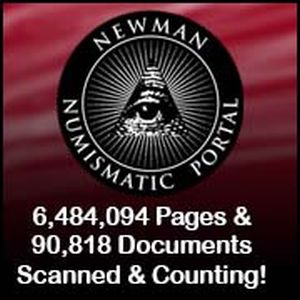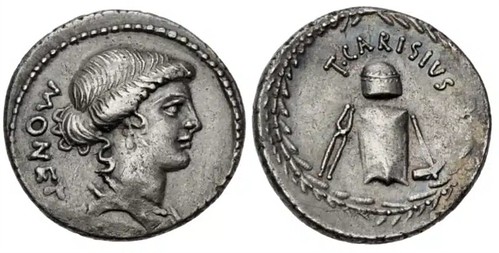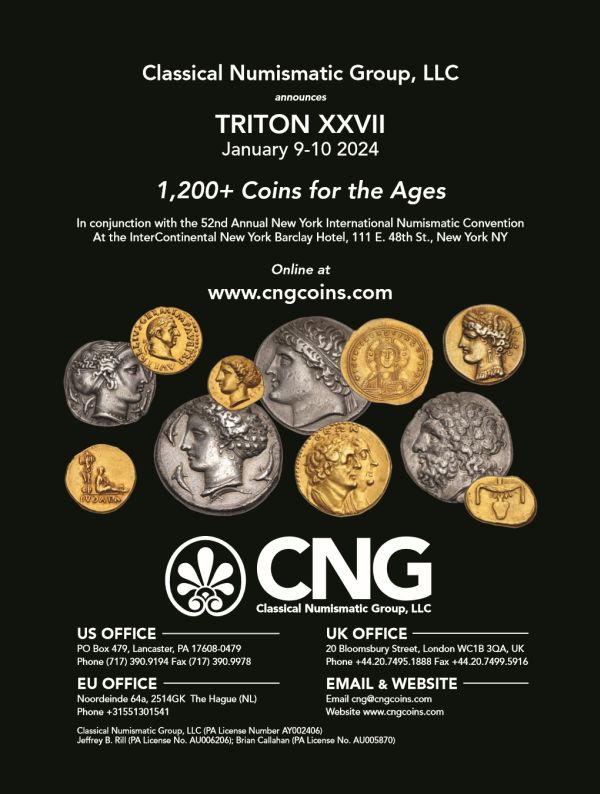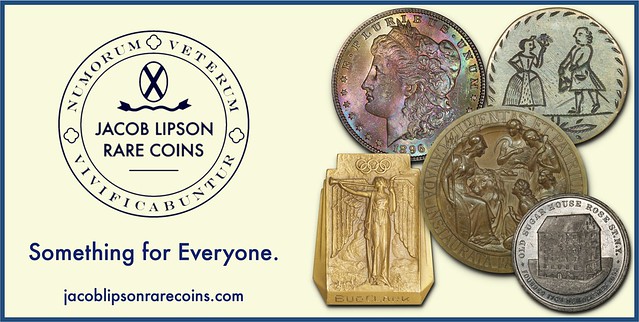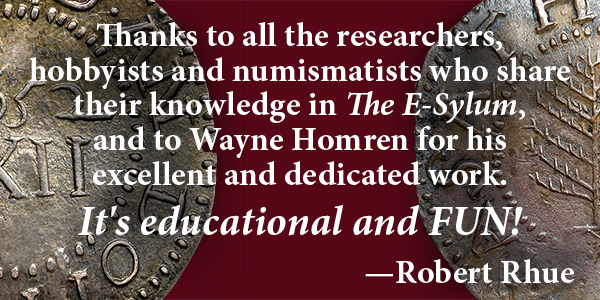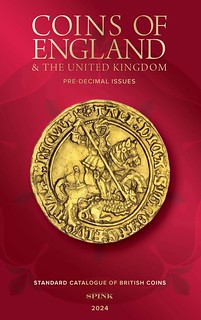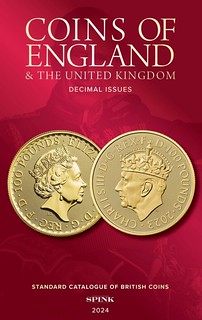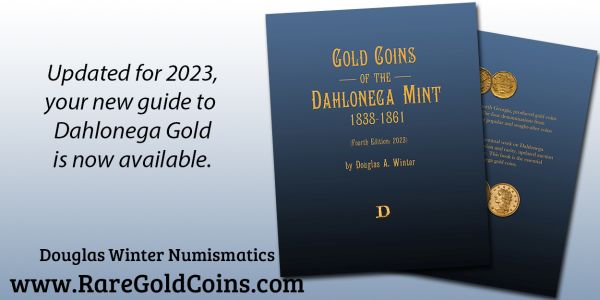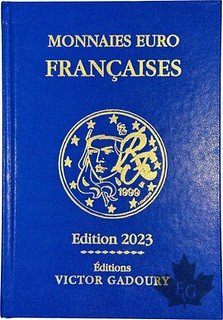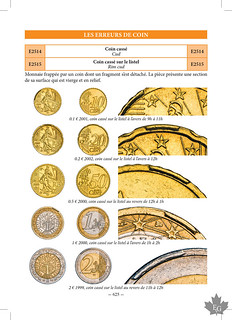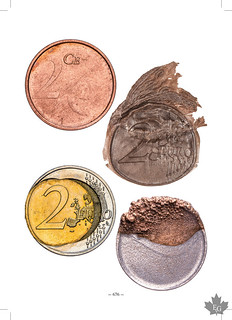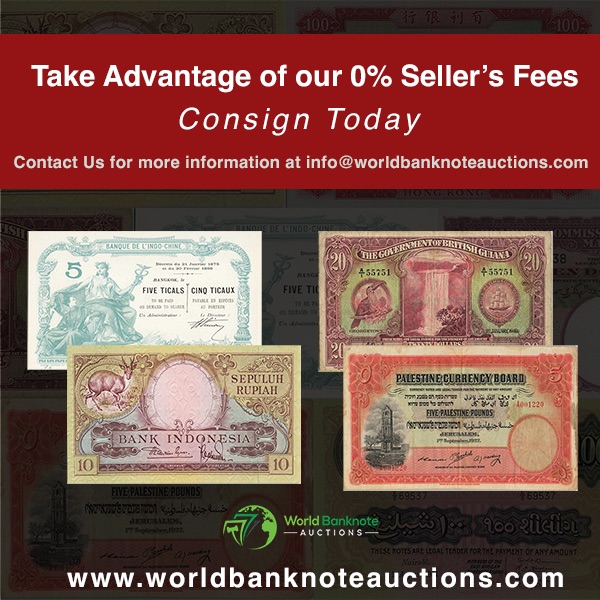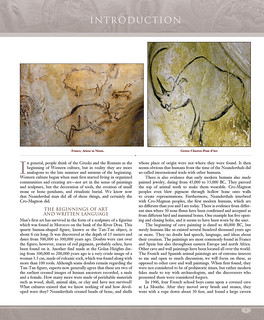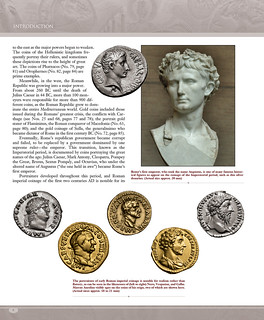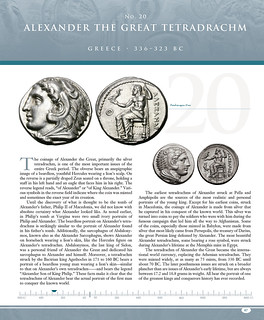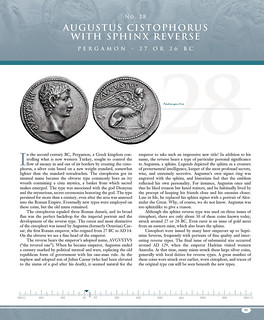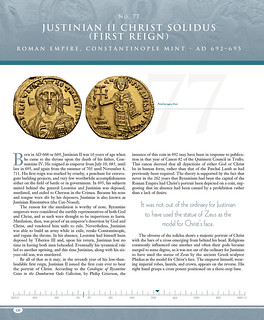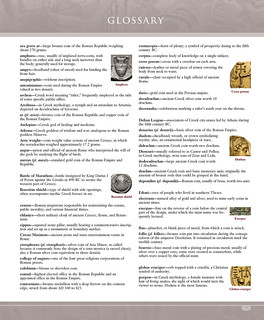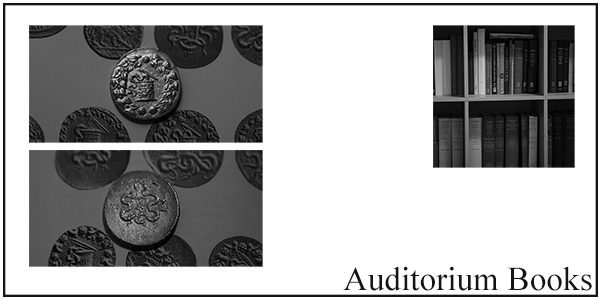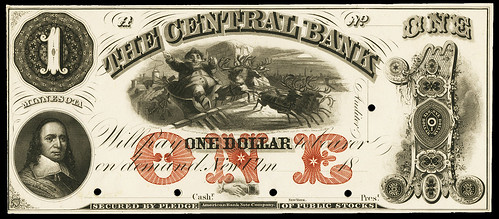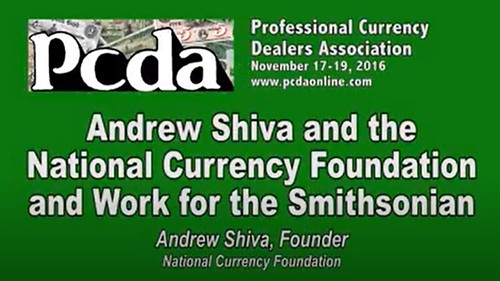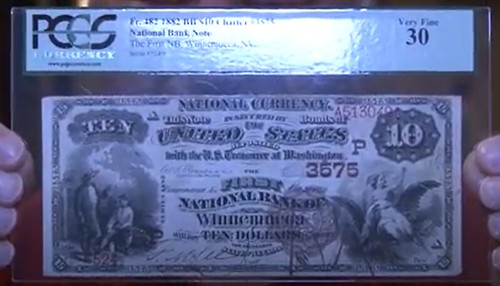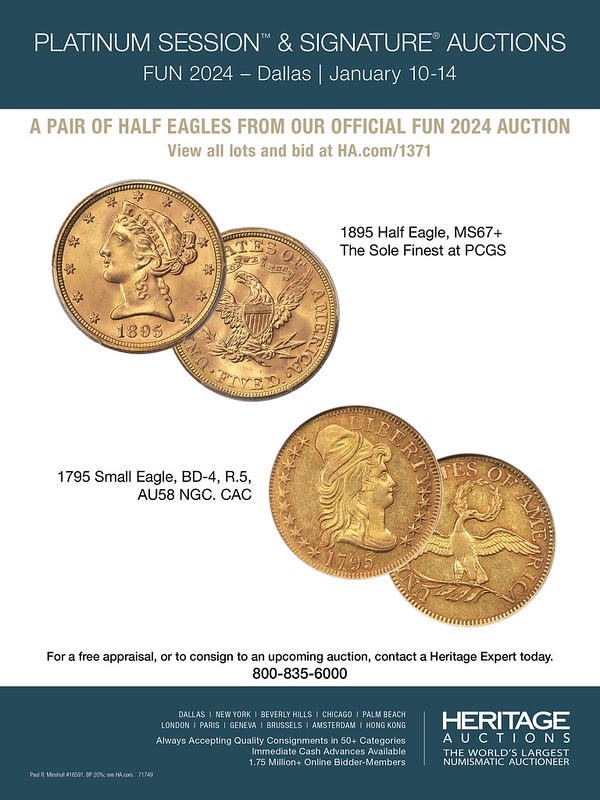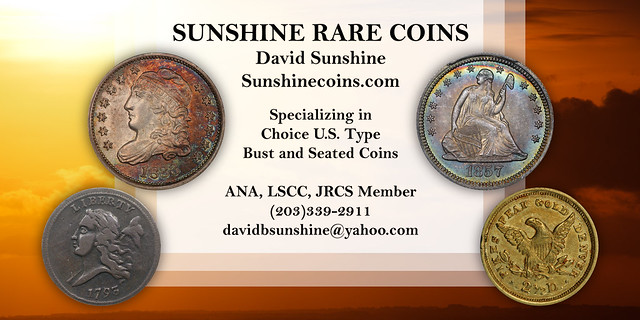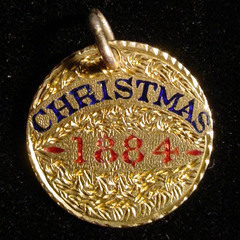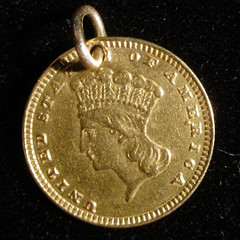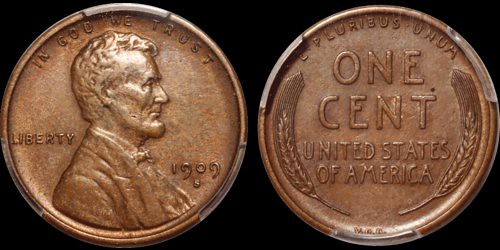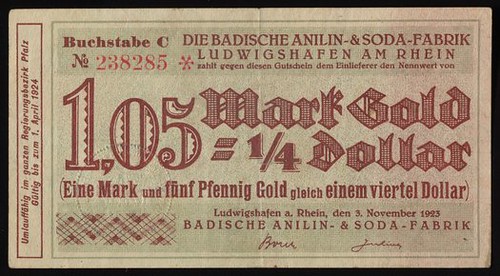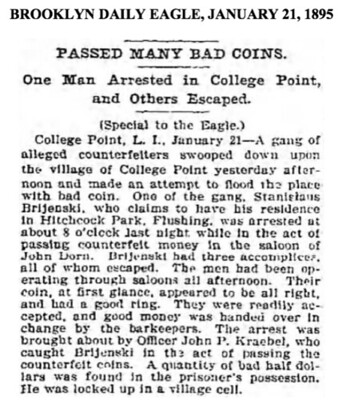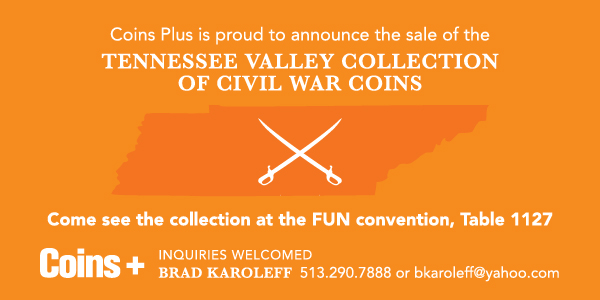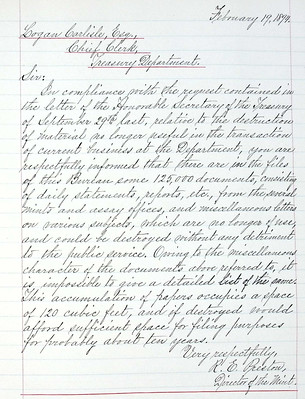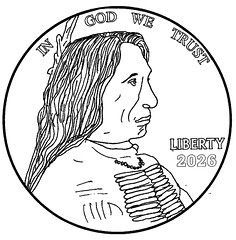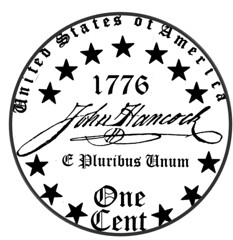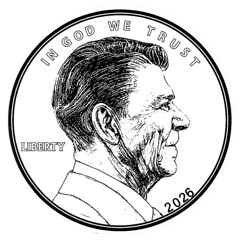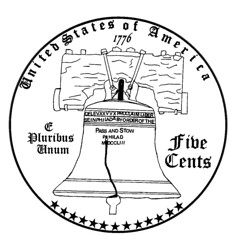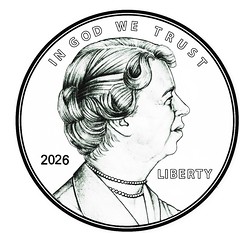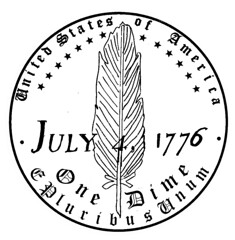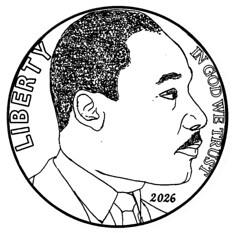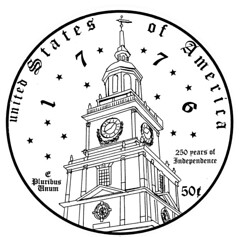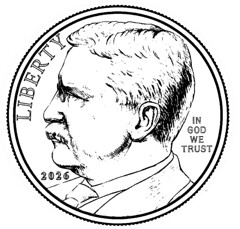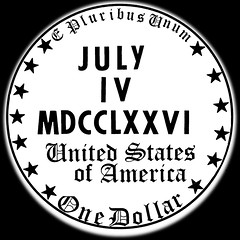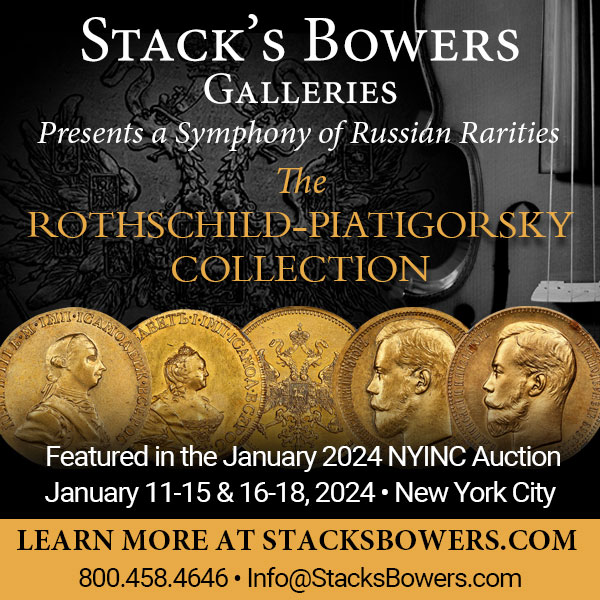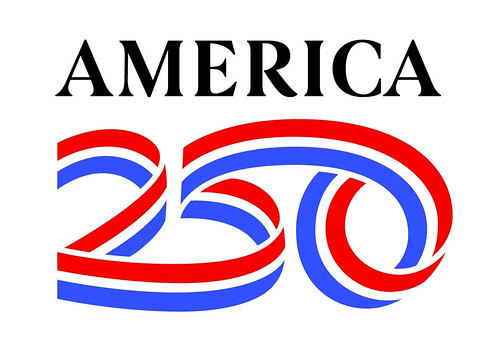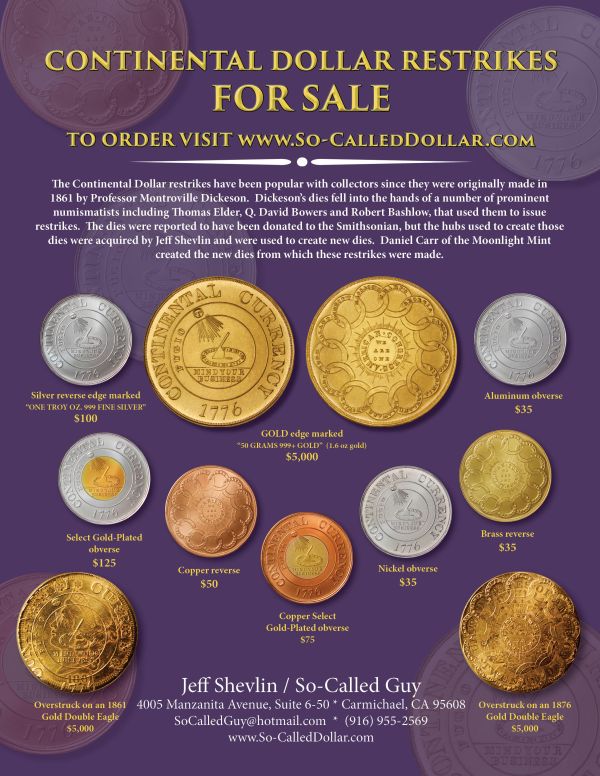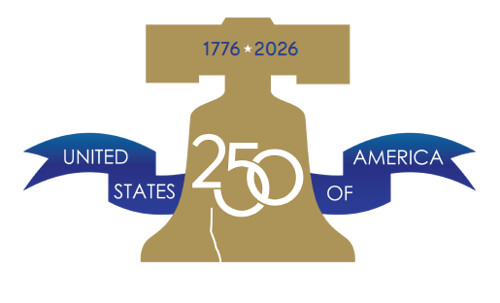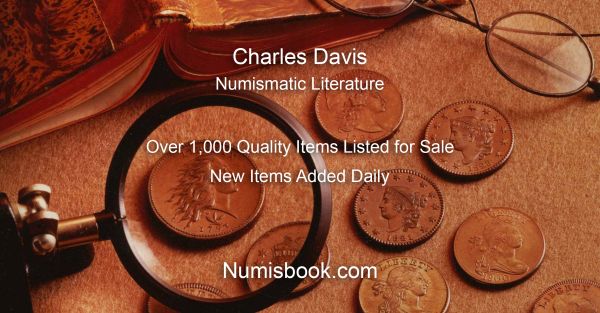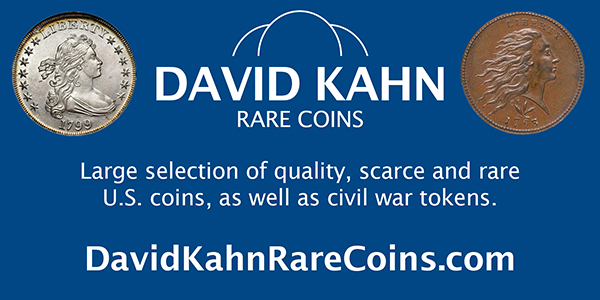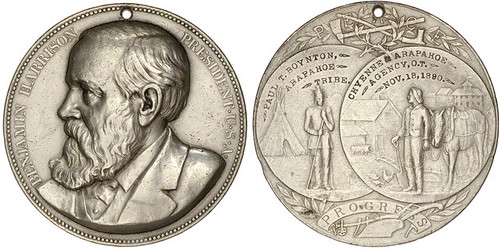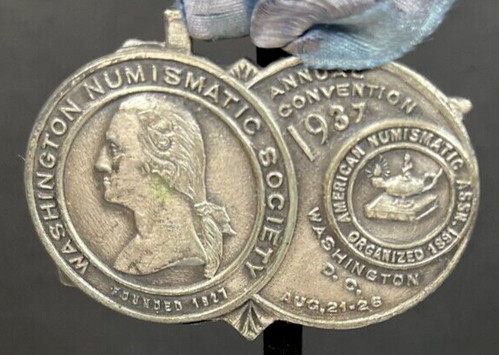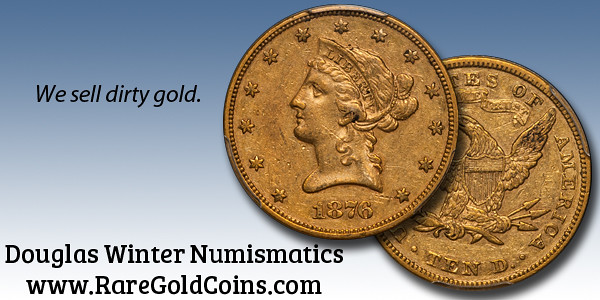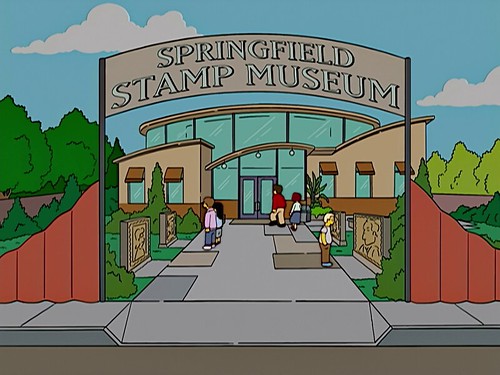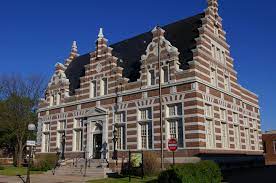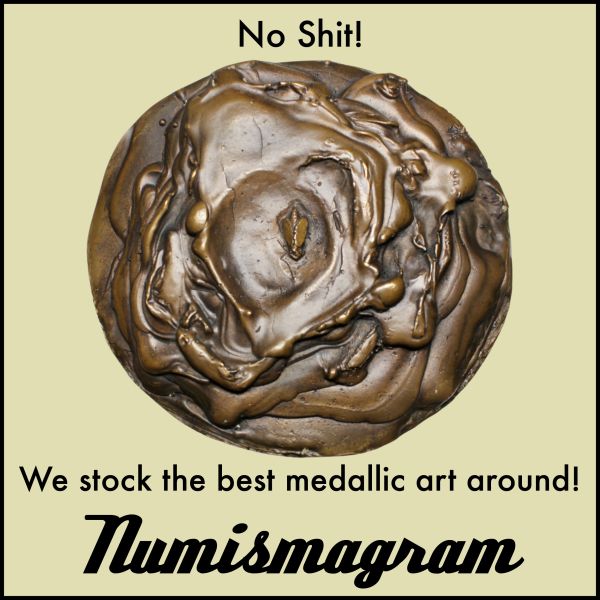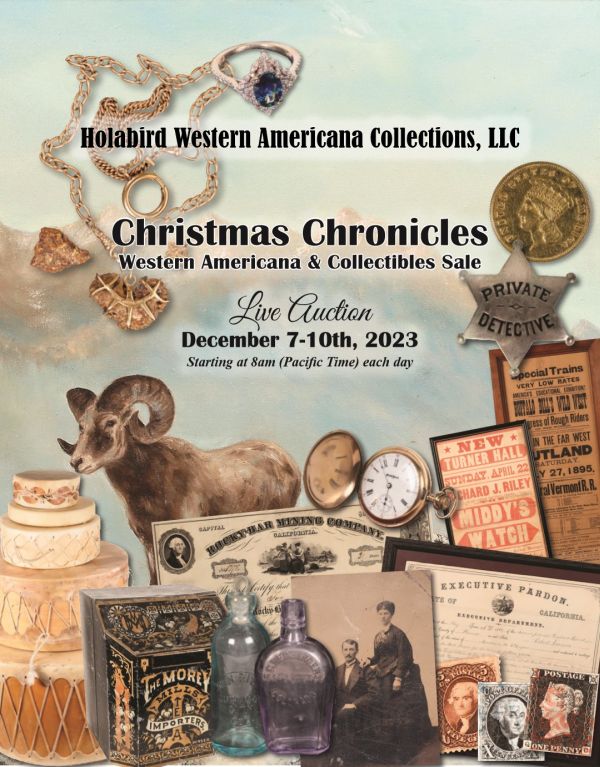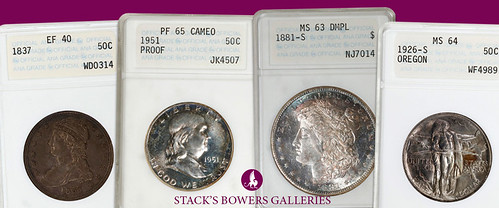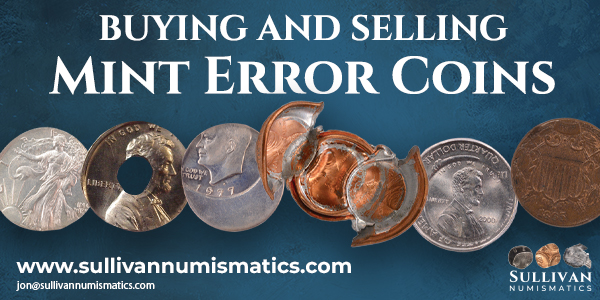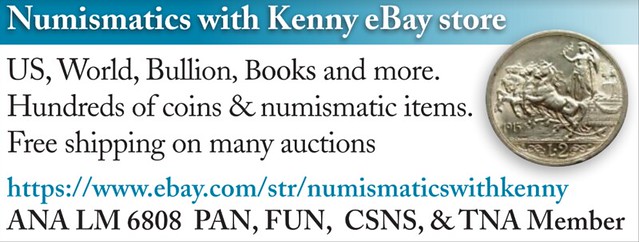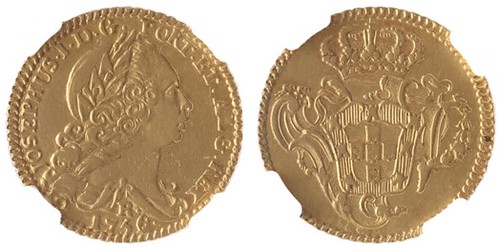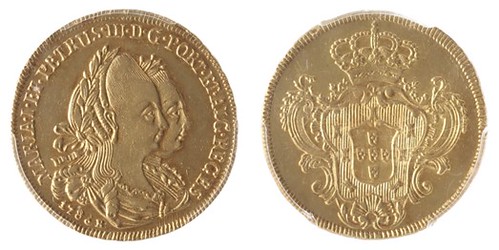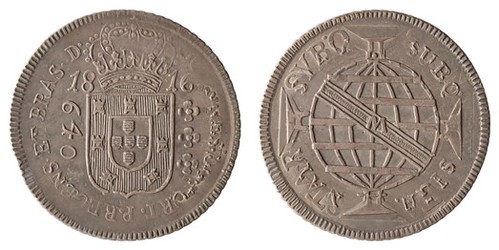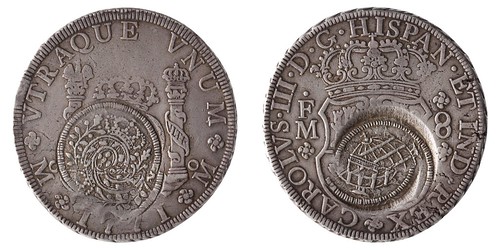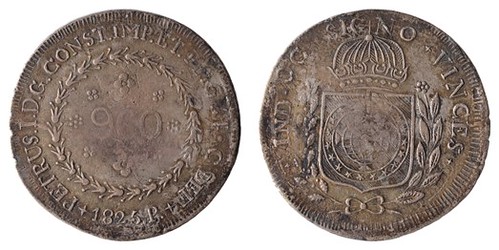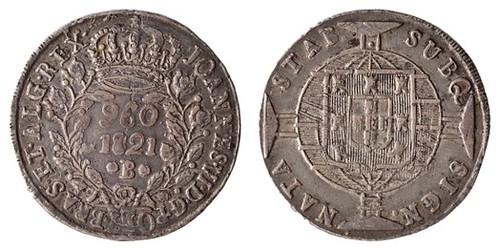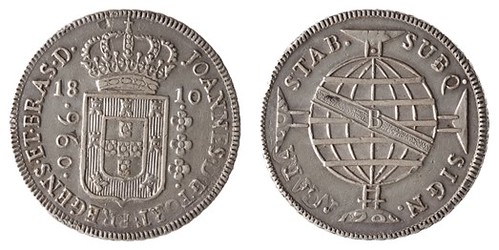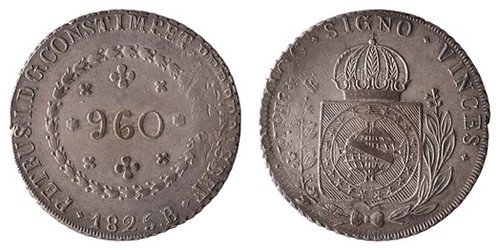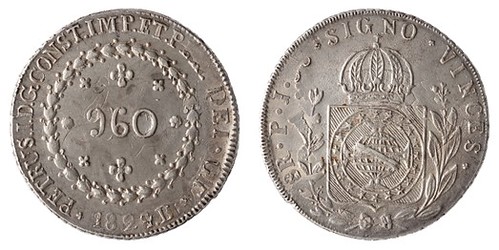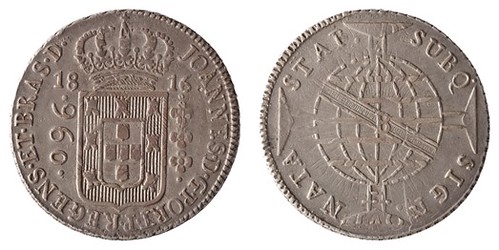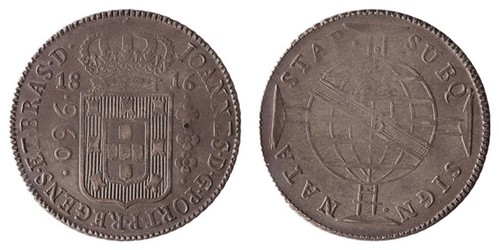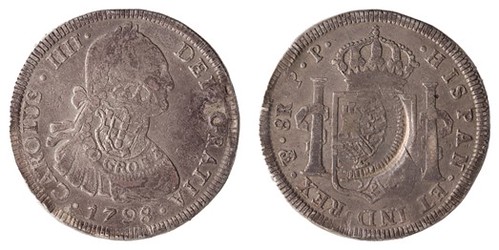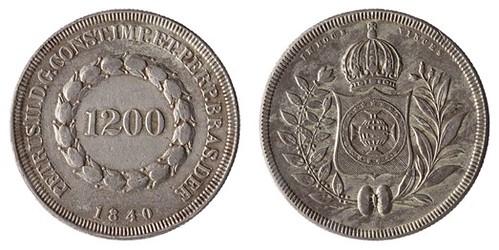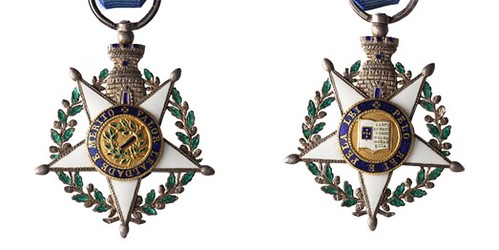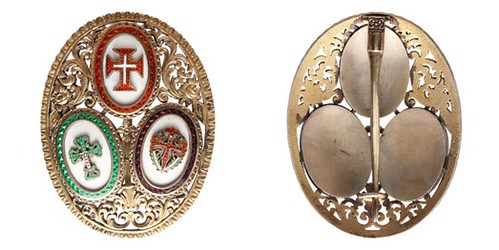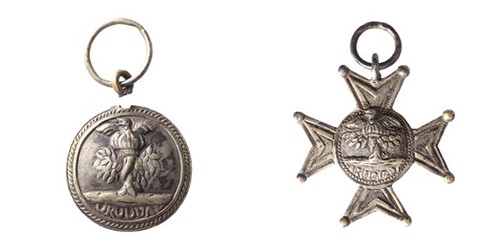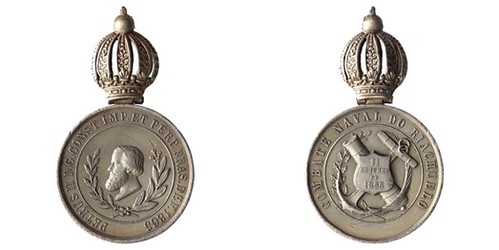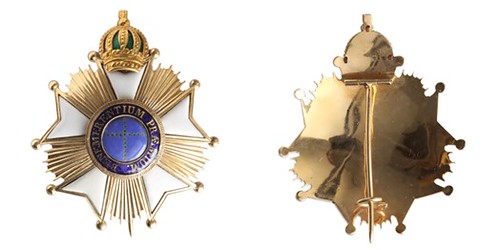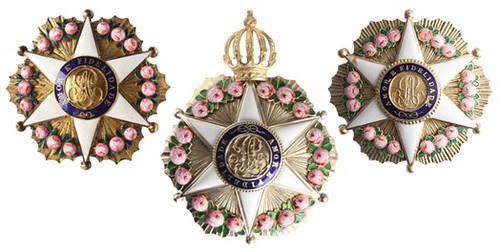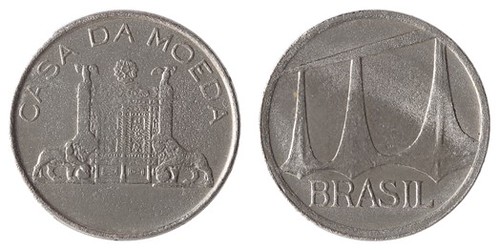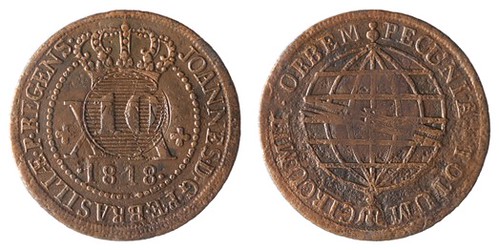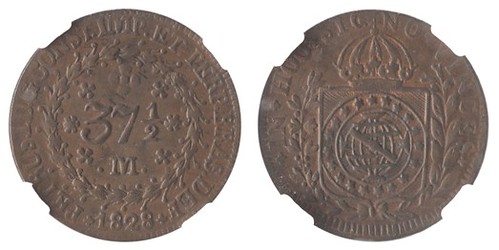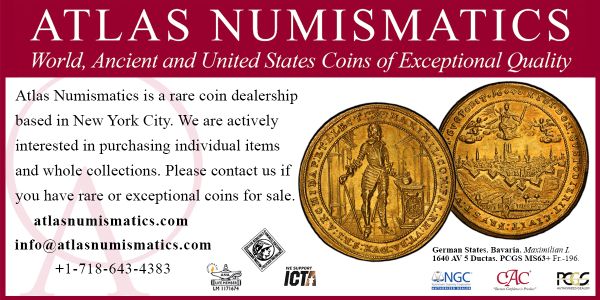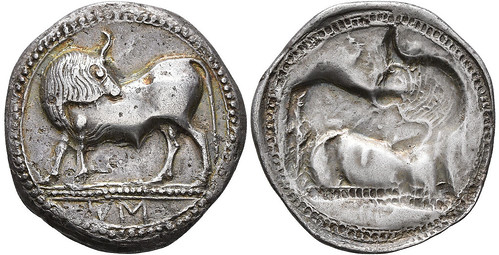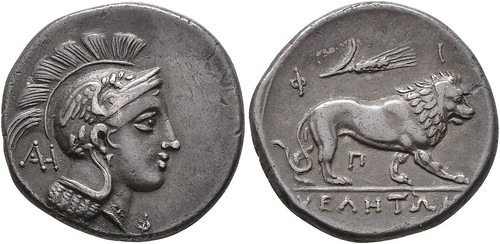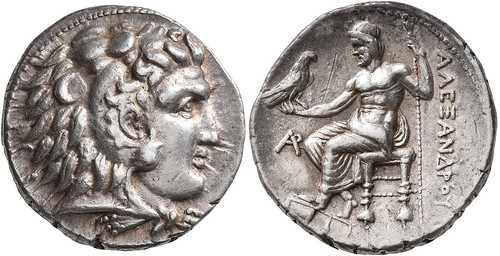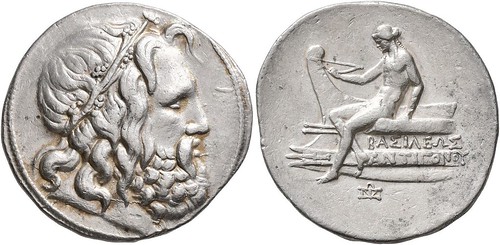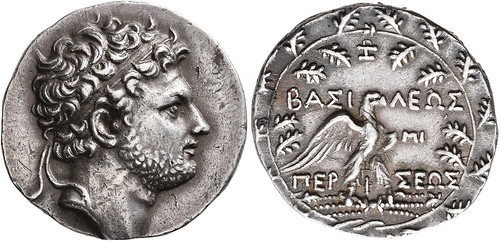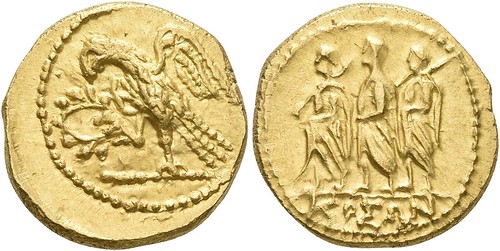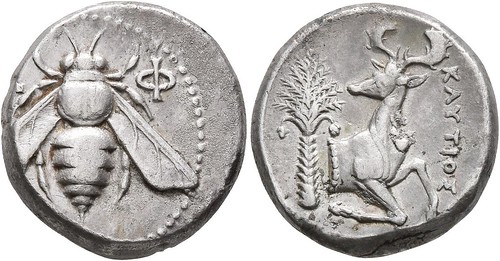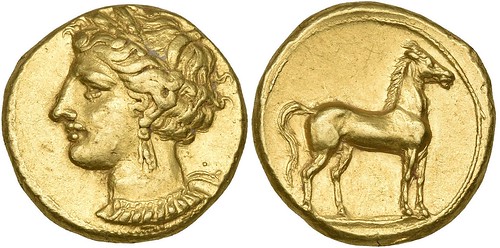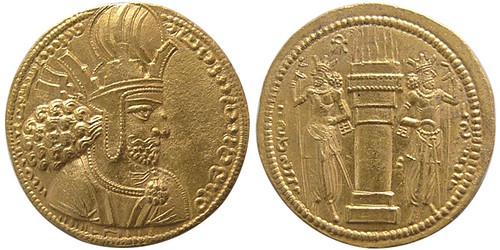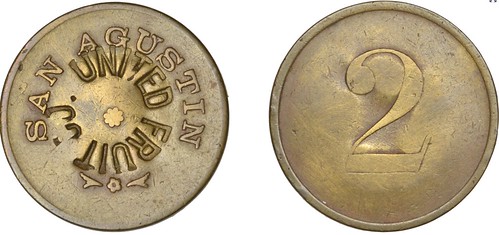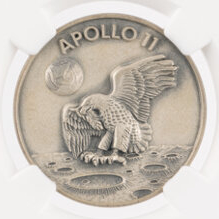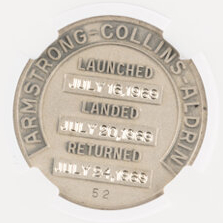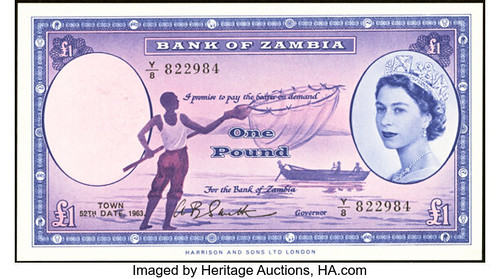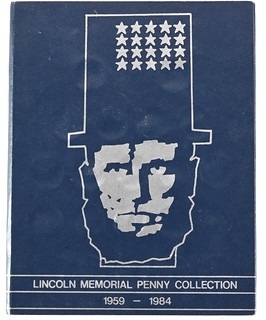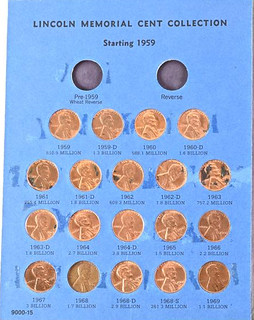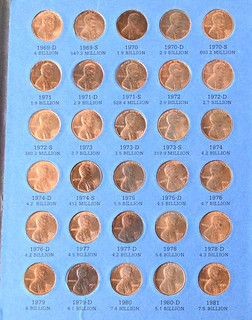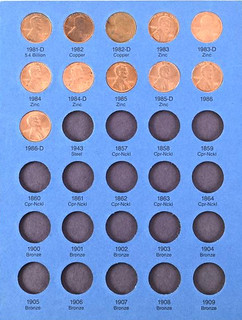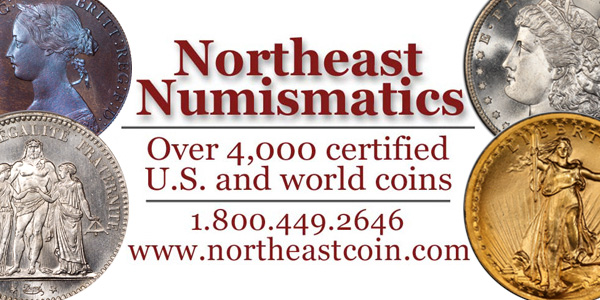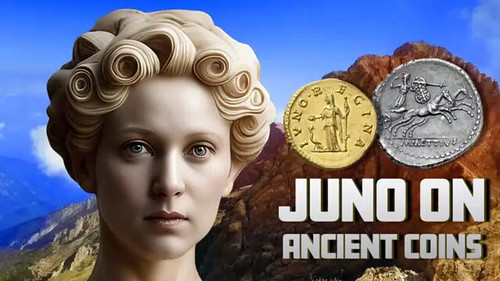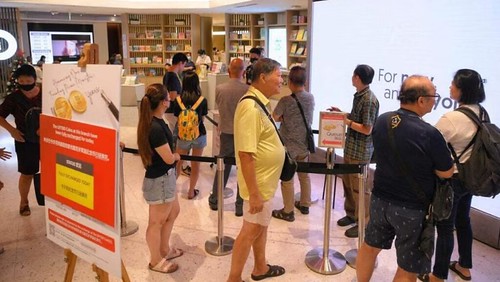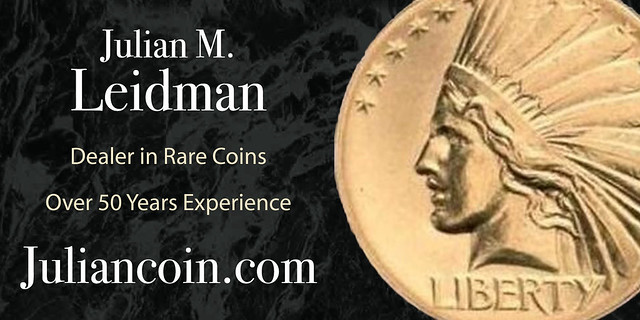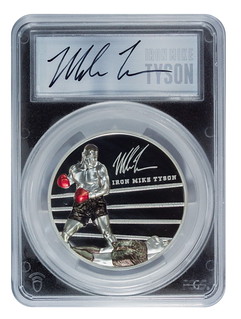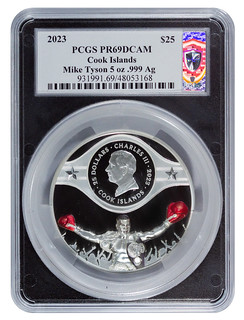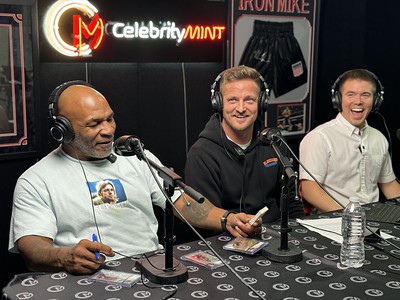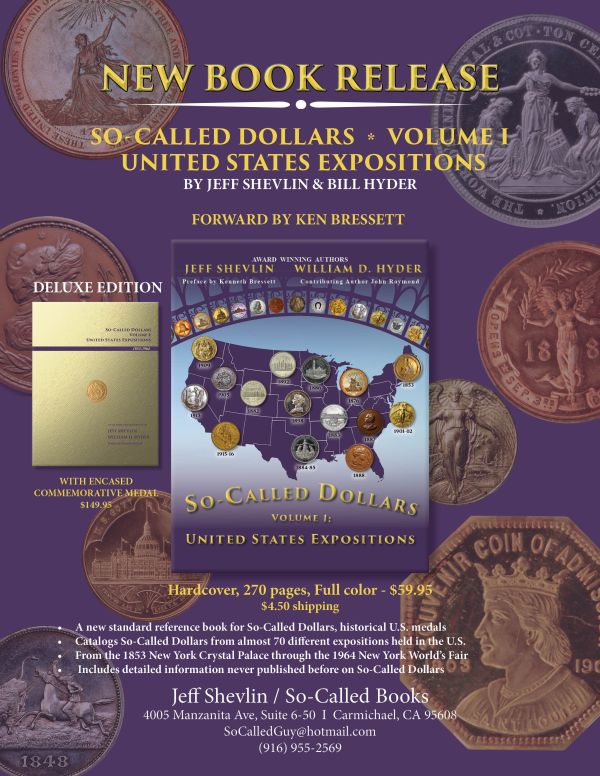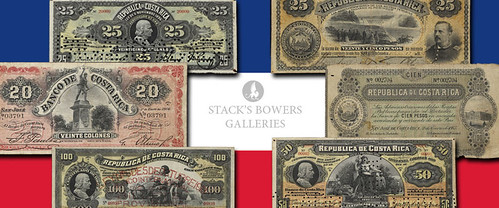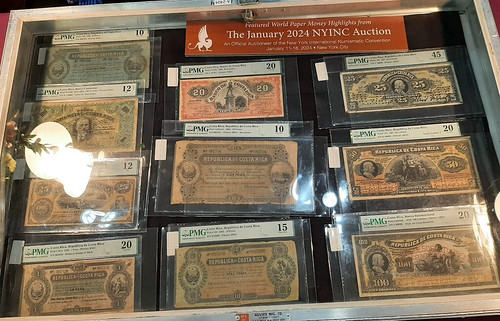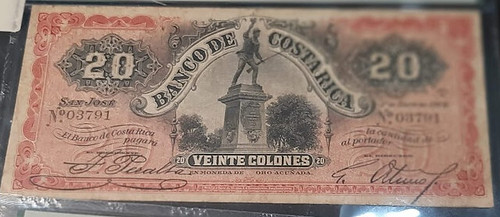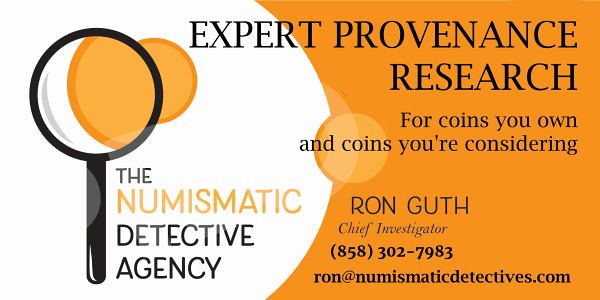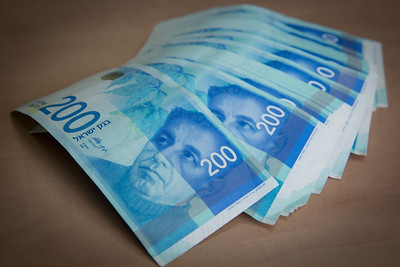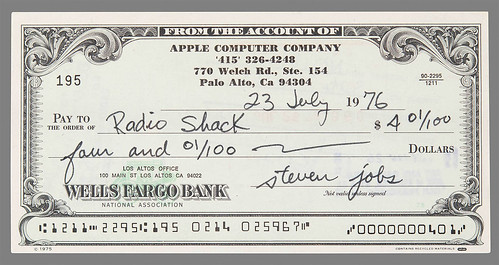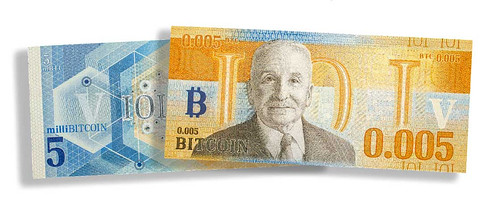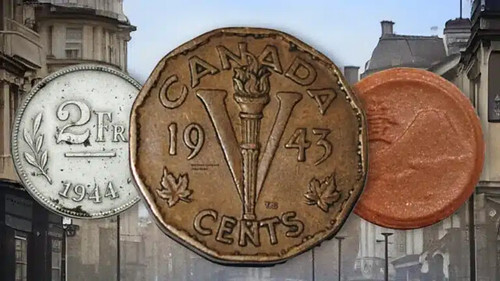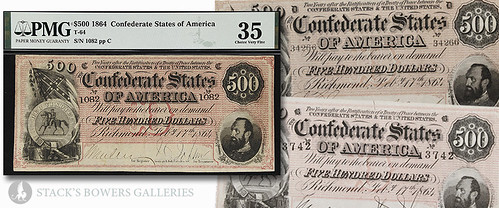
Visit our NBS Sponsors
About UsThe Numismatic Bibliomania Society is a non-profit association devoted to the study and enjoyment of numismatic literature. For more information please see our web site at coinbooks.org SubscriptionsThose wishing to become new E-Sylum subscribers (or wishing to Unsubscribe) can go to the following web page link MembershipThere is a membership application available on the web site Membership Application To join, print the application and return it with your check to the address printed on the application. Print/Digital membership is $40 to addresses in the U.S., and $60 elsewhere. A digital-only membership is available for $25. For those without web access, write to: Jeff Dickerson, Treasurer AsylumFor Asylum mailing address changes and other membership questions, contact Jeff at this email address: treasurer@coinbooks.org SubmissionsTo submit items for publication in The E-Sylum, write to the Editor at this address: whomren@gmail.com BUY THE BOOK BEFORE THE COINSale Calendar |
- WAYNE'S WORDS: THE E-SYLUM DECEMBER 10, 2023
- NBS BIBLIOTALK PODCAST WITH JOHN HOSKINS
- NEW BOOKS: COINS OF ENGLAND 2024
- NEW BOOK: MONNAIES EURO FRANCAISES 2023
- NEW BOOK: 100 GREATEST ANCIENT COINS, 3RD ED.
- BOOK REVIEW: THE 1909 LINCOLN WHEAT CENT
- SANTA CLAUS ON THE NEWMAN NUMISMATIC PORTAL
- VIDEO: NATIONAL CURRENCY FOUNDATION
- MORE ON MONEY MUSEUMS IN THE U.S.
- NOTES FROM E-SYLUM READERS: DECEMBER 10, 2023
- 1894 LETTER ON MINT DOCUMENT DESTRUCTION
- SEMIQUINCENTENNIAL COIN DESIGN IDEAS
- SEMIQUINCENTENNIAL LOGO REVEALED
- U.S. MINT SEMIQUINCENTENNIAL COIN SURVEYS
- VOCABULARY TERM: OVERLAP
- PHILATELIC MUSEUMS IN THE UNITED STATES
- DAVID SCHENKMAN INTERVIEW, PART SIX
- ANACS FIRST-GENERATION SLABS
- VILA RICA MOEDAS AUCTION 19
- THE LUGDUNUM AUCTION 23
- NUMISMATIC NUGGETS: DECEMBER 10, 2023
- JUNO ON ANCIENT COINS
- AUSSIES QUEUE FOR TWOS
- SINGAPORE LINES UP FOR $10 COINS
- MIKE TYSON'S
BADDEST COIN ON THE PLANET
- STACK'S BOWERS COSTA RICA BANKNOTES
- GAZA CASH CONVOY MOVES BANKNOTES
- APPLE COMPUTER CHECK BRINGS BIG BUCKS
- NOTEWORTHY ISSUES 0.005 BITCOIN NOTE
- LOOSE CHANGE: DECEMBER 10, 2023
Content presented in The E-Sylum is not necessarily researched or independently fact-checked, and views expressed do not necessarily represent those of the Numismatic Bibliomania Society.
WAYNE'S WORDS: THE E-SYLUM DECEMBER 10, 2023
 New subscribers this week include:
Stuart Weinerman.
Welcome aboard!
New subscribers this week include:
Stuart Weinerman.
Welcome aboard!
Thank you for reading The E-Sylum. If you enjoy it, please send me the email addresses of friends you think may enjoy it as well and I'll send them a subscription. Contact me at whomren@gmail.com anytime regarding your subscription, or questions, comments or suggestions about our content.
This week we open with a new NBS podcast, four new books, updates from the Newman Numismatic Portal, money museums, and more.
Other topics this week include Santa Claus notes, the National Currency Foundation, semiquincentennial coin designs, ANACS slabs, auction previews, Juno on ancient coins, worldwide coin mania, Gaza's cash convoy and new physical bitcoin notes.
To learn more about 1794 large cent pedigrees, coins of England and France, the 100 Greatest Ancient Coins, Dahlonega gold, U.S. Mint document destruction, overlap designs, Polhemus counterstamps, Brazil's titanium coin, the baddest coin on the planet, Juno Moneta, and the Sringfield Stamp Museum, read on. Have a great week, everyone!
Wayne Homren
Editor, The E-Sylum
NBS BIBLIOTALK PODCAST WITH JOHN HOSKINS
The latest episode of the Numismatic Bibliomania Society podcast is now available for listening. It's on the NBS web site but also available elsewhere. President Len Augsburger provided this report. -Editor
NBS Podcast Features Literature Collector John Hoskins
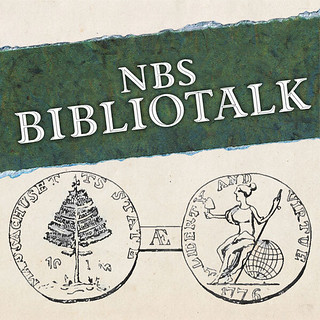 The latest episode of the NBS Bibliotalk podcast,
The latest episode of the NBS Bibliotalk podcast, A Research Library, with John Hoskins
is now available on the NBS website and other popular podcasting platforms such as Buzzsprout. Hoskins started as a young collector in the 1970s, picking out interesting pieces in pocket change. As often happens, John's interest in the hobby waned during his teenage years. John came back to the hobby in his early 30s, collecting early U.S. copper and consulting the related works on varieties by Bill Noyes and John Wright.
In the 2010s, John became more interested in collecting the earliest literature related to U.S. copper and colonial coins. His first significant acquisition was a plated Chapman catalog (Beckwith, 1923), and most of his purchases are guided by the research value of a given volume. Pedigrees of 1794 large cents are a particular interest, and Hoskins has made a number of discoveries in the ownership chains of various examples. John's interests are not exclusively focused on U.S. numismatics, and he also pursues literature in the fields of ancient numismatics, European medals, and Conder tokens. John is especially drawn to literature in its original state, volumes which have not been rebound or excessively repaired. Join us for this podcast, Including John's story of how he saved $10,000 by not buying a particular item at the Syd Martin library sale.
The NBS podcast is hosted and produced by Lianna Spurrier of Numismatic Marketing.
Link to A Research Library, with John Hoskins
on the NBS website:
https://www.coinbooks.org/resources/podcast.html
NEW BOOKS: COINS OF ENGLAND 2024
The 2024 editions of Coins of England have been published by Spink. -Editor
Coins of England and the United Kingdom Pre-Decimal and Decimal volumes comprise the Standard Catalogue of British Coins, and is still the only catalogue to feature every major coin type from Celtic to the Decimal coinage of Queen Elizabeth II. The 10th edition of the Decimal volume contains all coins minted during the reign of Queen Elizabeth II, also introducing the new coinage of King Charles III.
Coins of England & the United Kingdom 2024, Pre-Decimal Issues, 59th edition
£35.00
Hardback / 216 x 138mm / 640 pages with colour illustrations throughout
ALSO AVAILABLE AS A DOWNLOADABLE PDF
This historic reference work for British coins is still the only catalogue to feature every major coin type from Celtic to the Decimal coinage of Queen Elizabeth II, arranged in chronological order and divided into metals under each reign, then into coinages, denominations and varieties. All decimal coinage since 1968 is listed in a separate volume, available as an independent publication.
The catalogue includes up-to-date values for every coin, a beginner's guide to coin collecting, numismatic terms explained and historical information about each British coin, from our earliest (Celtic) coins, Roman, Anglo-Saxon and Norman coins, the coins of the Plantagenet Kings, the Houses of Lancaster and York, the Tudors and Stuarts, to the more modern Milled coinage, minted for the first time in 1561 during the reign of Elizabeth I.
From the earliest of times, coins have been used by states or monarchs to communicate with people; Coins of England is therefore not only a reference book for collectors, but a fascinating snapshot of British history, illuminating its economics, technology, art, politics and religion. Over 3,000 price changes have been made in this edition to reflect market activity during the past year.
Coins of England & the United Kingdom 2024, Decimal Issues, 10th edition
£20.00
Hardback / 216 x 138mm / 440 pages with colour illustrations throughout
ALSO AVAILABLE AS A DOWNLOADABLE PDF
Coins of England and the United Kingdom Pre-Decimal and Decimal volumes comprise the Standard Catalogue of British Coins. This 10th edition of the Decimal volume contains all coins minted during the reign of Queen Elizabeth II, also introducing the new coinage of King Charles III.
The Decimal issue gives a comprehensive overview of all individual coins and sets issued by the Royal Mint since 1971 (and in circulation since 1968), offering an authoritative catalogue of modern British coins.
For more information, or to order, see:
Coins of England & the United Kingdom 2024, Pre-Decimal Issues, 59th edition
(https://spinkbooks.com/products/coins-of-england-the-united-kingdom-2024-pre-decimal-issues-59th-edition)
Coins of England & the United Kingdom 2024, Decimal Issues, 10th edition
(https://spinkbooks.com/products/coins-of-england-the-united-kingdom-decimal-issues-10th-edition)
NEW BOOK: MONNAIES EURO FRANCAISES 2023
The new 2023 edition of the book on French Euro coins has been published by Gadoury. -Editor
- Monnaies Euro Francaises 2023
- Author: LAURENT BONNEAU
- Publisher: Gadoury
- Year: 2023
- Language: French
- Available
- € 59.00
This unique work is an opportunity to retrace European construction since 1992 through monetary history. City ECUs and euros, circulation and collector's coins, including tests, blanks, varieties and faults.
For more information, or to order, see:
https://www.gadoury.com/fr/livres/monnaies-euro-francaises-2023
NEW BOOK: 100 GREATEST ANCIENT COINS, 3RD ED.
Whitman has announced the new edition of Harlan Berk's 100 Greatest Ancient Coins. -Editor
The third edition of Harlan J. Berk's 100 Greatest Ancient Coins will debut in December 2023, available from bookstores and hobby shops nationwide, and online (including at Whitman.com). Here, David Hendin, vice president and adjunct curator of the American Numismatic Society, shares his thoughts on the book and its author.
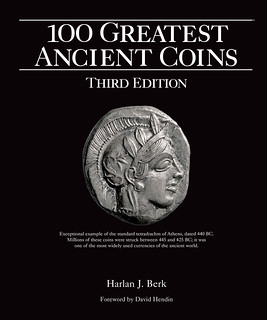 The greatest thing about Harlan Berk's 100 Greatest Ancient Coins—aside from the coins!—is
that even family and friends of collectors will appreciate the fabulous photos of these treasures
and Harlan's concise historic explanations. Collectors fear not, however, since Harlan has also
provided current scholarly information to satisfy them as well. He also gives us a book that
covers Greek, Roman, and so-called Byzantine coins in a single, impressively entertaining and
informative volume.
The greatest thing about Harlan Berk's 100 Greatest Ancient Coins—aside from the coins!—is
that even family and friends of collectors will appreciate the fabulous photos of these treasures
and Harlan's concise historic explanations. Collectors fear not, however, since Harlan has also
provided current scholarly information to satisfy them as well. He also gives us a book that
covers Greek, Roman, and so-called Byzantine coins in a single, impressively entertaining and
informative volume.
I can't think of another person more qualified to have written this popular book than Harlan J. Berk. He is a serious collector and connoisseur of art and paintings. (He has amassed the best- known collection of Chicago Modernists.) Anyone who has even chatted casually with Harlan knows his excitement for the subjects, as well as his expertise. He has also been a leading coin dealer, based in Chicago, for more than fifty years. He maintains an extensive numismatic library at his office and welcomes collectors and scholars. I'm proud to say that we have been friends for fifty years or so.
Harlan is obsessed with beauty and workmanship of coins, which, he notes, have been collected
almost since they were issued. There is evidence that the leaders of some great cities issued
wonderful artistic coins made by recognized artists so that future generations would know what
heights they reached. . . . Renaissance kings and princes collected coins. . . . Today ancient coins
are collected around the globe.
If you are one of those readers who tend to skip the text and admire the beautiful photos and look up values—don't even think about it. Harlan's notable introduction explains a great deal about ancient art and how it evolved; in the third edition of 100 Greatest Ancient Coins he adds a new section on cave paintings. We also get Harlan's quick guided tour of coinage from the beginning up to the Eastern Roman Empire (the topic of one of his other important books), as well as an overview of collecting, grading, and authentication. Especially illuminating is Harlan's snapshot of how the values of these coins have evolved from the mid-twentieth century forward. I've been reading about ancient coins for more than fifty-five years, and I learned something!
In this third edition, Harlan has paid special attention to updating his text on Tyre shekels, coins with portraits of Cleopatra VII, Athenian owl tetradrachms (a significant summary that updates dating theories and suggests that some later Athens types, once believed to be Athenian in origin, were actually struck in the ancient East), the Horseman staters of Tarentum, Brutus's Eid Mar coins, Nero's Port of Ostia sestertius, Titus's Colosseum sestertius, Constantine IV folles, and the Judaea Capta sestertius. Photos of these coins and others have been upgraded to even more fabulous than in previous editions.
If you are a collector on a budget, you don't need to worry. If you cannot afford to purchase all
100 of these significant coin types, there are many first-cousins of the 100 Greatest
that can
still be purchased for less than $100.
It's not easy to write about the best 100
of anything. Harlan presents his numismatic hit parade
in the order they were issued, hence #87, the Ionia electrum stater, is listed first. There is also an
appendix that lists the coins in their order of greatness,
as well as an appendix that shows the
coins in actual size alongside each other together with dimensions, weight, and page number
where the coin is featured.
Even some collectors often pass over words they do not fully understand. Harlan provides a brief but excellent illustrated glossary of terms, locations, and mythological and actual names that enhance the book's value.
It's no wonder that the first two editions of this classic book are out of print.
It is the perfect
gift for your cousin, aunt, uncle, mom, dad, sibling, grandpa, or friend who collects ancient
coins. In fact, it's a fun book to read for anyone interested in ancient history.
Coin collectors have a well-known saying: Buy the book before the coin.
In this case you must
have the book, so in this case it is okay to buy it before or after you buy the coin. You will be
paging through it for many years to come.
100 Greatest Ancient Coins, third edition
By Harlan J. Berk; foreword by David Hendin.
ISBN 0794850692
Hardcover, coffee-table size. 152 pages. Full color.
Retail $34.95 U.S.
URL:
https://whitman.com/100-greatest-ancient-coins-3rd-edition
BOOK REVIEW: THE 1909 LINCOLN WHEAT CENT
The December 2023 issue of ErrorScope from the Combined Organizations of Numismatic Error Collectors of America (CONECA) included a review by Greg Bennick of Shawn Tew's new book The Rabbit Hole of the 1909 Lincoln Wheat Cent. With permission, we're republishing it here. Thanks to Greg and ErrorScope editor Allan Anderson. -Editor
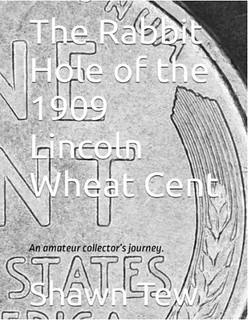 Congratulations to Shawn Tew on the publication of not just an insightful book on a classic American coin, but an important exploration into variety collecting overall. The 1909 cent is and has been an American classic for generations, but few know the aspects of the coin's history from the perspectives this book offers. Tew starts by giving us insight into the transition between the Indian cent and Lincoln cent designs from within the mint, and the inner dynamics between engravers at the time – inner workings which were not always smoothly collaborative.
Congratulations to Shawn Tew on the publication of not just an insightful book on a classic American coin, but an important exploration into variety collecting overall. The 1909 cent is and has been an American classic for generations, but few know the aspects of the coin's history from the perspectives this book offers. Tew starts by giving us insight into the transition between the Indian cent and Lincoln cent designs from within the mint, and the inner dynamics between engravers at the time – inner workings which were not always smoothly collaborative.
Shawn's book is extensively researched, exploring the now-known varieties of reverses for the 1909 cent. Thanks to recent discoveries, and the author and collaborators exploring the rabbit hole
of this area of study, substantial detail is documented in the pages of this book which has not appeared elsewhere. The research is new, and the publication of this book will certainly draw attention to the 1909 cent, even more so than it has had for the last 100+ years.
The book is easy to read, and the research has been quite thorough exploring letters and history between engraver Charles Barber who was in his late 60's around the time this Lincoln cent transition happened, and the talented young Victor David Brenner, just 38 at the time of the letters. The book describes the seeming distaste that Barber had for Brenner. We get to read those letters and can see that Barber offers a tone to Brenner which is patriarchal at best and condescending at worst. Barber describes details about the minting process that Brenner already would likely have known and was clearly pulling rank.
The book is an excellent study on varieties overall in that it gives the backstory for how this particular series of varieties came about. And there are more coins to explore than just the two reverses (this is the rabbit hole
). The book shifts the study of varieties from being one of classification of types, to being an exploration of how those types came to be. We read how the master hubs during the transitional year in 1909 for the Lincoln wheat cent created two different reverses but what is truly fascinating is that the majority of work on the reverses of the 1909 cent was not done until just recently. A grand hoard of uncirculated cents was put away in August of 1909, which allowed research on finely detailed parts of the reverses of these coins to take place only recently.
This book explains that process and offers historical analysis and does so in great detail during its 114 pages. To the reader, it becomes apparent throughout that there are always discoveries to be made, regardless of how old the coin is or how much research has been done. Certainly the 1909 VDB and 1909 S-VDB cents have already had their share of attention over the last century.
This book sheds new light on new research and is an important part of the story of American coinage and of variety collecting - and also of errors – overall.
The book even explores the intersection of technology and numismatic research in describing advanced microscopy exploration of the Type One and Type Two reverses known for the 1909 cent.
Overall, this book is recommended for anyone interested in numismatic research, analysis of varieties, or history. Tew offers new insights into the reverses of these seemingly old cents and provides new historical and numismatic context on a level that has not been done with this particular issue before.
The book is available in hardcover on Amazon.
Interested in error and variety coins? Join CONECA!
https://conecaonline.org/
For more information, or to order, see:
The Rabbit Hole of the 1909 Lincoln Wheat Cent [Print Replica]
(https://www.amazon.com/Rabbit-Hole-1909-Lincoln-Wheat-ebook/dp/B0CDHKT891)
To read the earlier E-Sylum article, see:
THE RABBIT HOLE OF THE 1909 WHEAT CENT
(https://www.coinbooks.org/v26/esylum_v26n30a10.html)
NEW BOOK: THE 1909 LINCOLN WHEAT CENT
(https://www.coinbooks.org/v26/esylum_v26n33a04.html)
THE BOOK BAZARRE
SANTA CLAUS ON THE NEWMAN NUMISMATIC PORTAL
Newman Numismatic Portal Project Coordinator Len Augsburger provided the following seasonal report. -Editor
There is No Santa Claus in Numismatics
An old saw holds that there is no Santa Claus in numismatics.
A quick check of the Newman Portal reveals the saw to not be so old; indeed, most of the early uses appear in the Bowers house publications beginning in 1970. Bowers in turn credits Lee Hewitt, but even there the Numismatic Scrapbook uses the phrase only beginning in 1969. Regardless of when it first appeared, today we can say that Santa Claus appears frequently in numismatics, with 3,486 records identified across the Newman Portal.
Santa Claus notes are especially popular among paper money collectors, with this New Ulm, MN proof note attracting a winning bid of $35,250 in the Newman VI sale (Heritage Auctions, April 23, 2015), lot 19159. The Heritage catalog notes that this is the only known Santa Claus vignette among Minnesota notes. The rendering of Santa Claus by Baldwin, Adams & Co. would not be terribly recognizable to modern viewers, but the sleigh and reindeer clearly invoke the mythology of St. Nick.
Link to Santa Claus
items on Newman Portal:
https://nnp.wustl.edu/library/searchwithterms?searchterm=santa%20claus
VIDEO: NATIONAL CURRENCY FOUNDATION
The David Lisot Video Library on the Newman Numismatic Portal can be found at:
https://nnp.wustl.edu/library/multimediadetail/522852
We highlight one of his videos each week in The E-Sylum. Here's one from 2017 with Andrew Shiva speaking about the National Currency Foundation. -Editor
Andrew Shiva, Founder, National Currency Foundation, interviewer: David Lisot, CoinTelevision.com. VIDEO: 2:41.
A person committed to the pursuit of knowledge about United States paper money and especially national bank notes is Andrew Shiva. Hear from this extraordinary individual who has done so much work for the field of collecting.
To watch the complete video, see:
https://nnp.wustl.edu/library/book/548606
MORE ON MONEY MUSEUMS IN THE U.S.
Last week Pete Smith enumerated Money Museums in the United States, past and present. Here are some reader notes on the topic. -Editor
John Phipps adds:
Dahlonega Gold Museum in Dahlonega, Georgia
https://www.stateparks.com/dahlonega_gold_museum_historic_site_in_georgia.html
DAHLONEGA GOLD MUSEUM HISTORIC SITE
Twenty years before the famed 1849 gold rush in California, thousands of prospectors flocked into the Cherokee Nation in north Georgia, marking the true beginning of our country's first gold rush. Their dramatic story is told inside the historic 1836 Lumpkin County Courthouse, the oldest courthouse in Georgia. Dahlonega prospered with this mining activity, and a U.S. Branch Mint opened in 1838, coining more than $6 million in gold before closing in 1861. The museum's exhibits include a set of these coins, a nugget weighing more than five ounces, a large hydraulic cannon and nozzle used to blast soil from mountainsides, a film and gift shop.
Newman Numismatic Portal Project Coordinator Len Augsburger writes:
I should clarify Pete's comments regarding the Newman Money Museum, which was operated from 2006-2018 in the Kemper Art Building on the Washington University campus in St. Louis. The Museum was closed in 2018. Today, Olin Library, on the same campus, periodically features numismatic exhibits in the Newman Tower exhibit gallery, which is located on the main floor of the library. A new group of such exhibits will be opening in mid-January, and more information will be forthcoming on this topic.
Larry Edwards provided some address updates:
Great list of money museums!
Federal Reserve Bank of Chicago is at 230 S. LaSalle Street.
Chicago History Museum is at 1601 N. Clark St (which is actually the SW corner of Lincoln Park) but GPS might do better with the address.
Blind Coin Collector blogger Tom Babinszki writes:
I was so happy to read the list of museums last week, it definitely put a few on my bucket list I have never heard about. Though probably Howard Berlin knows them all, as I understand he by far didn't cover all the museums of the world in his Numismatourist book.
I would like to contribute a few more items to the list, which I have personally visited and mostly written about.
I think the only major miss here was the Coin Gallery of the Museum of Fine Arts in Boston, which has a huge and extensive collection.
Here is a direct link to the collection:
https://www.mfa.org/gallery/ancient-coins
And what I wrote about my visit:
https://blindcoincollector.com/2016/12/10/visiting-the-coin-gallery-at-the-museum-of-fine-arts-in-boston/
The rest of the museums I know are much smaller, but I feel they would be worth mentioning:
The Ottilia Buerger collection and more items at the Lawrence University in Appleton, Wysconsin.
Their web site is:
https://library.artstor.org/#/collection/87732176
I wrote about their coin petting zoo project at:
https://blindcoincollector.com/2019/12/08/coin-petting-zoo-at-the-lawrence-university/
The New Orleans Mint Museum. It is at the bottom of the Jazz Museum, if you ask me it is rather underwhelming, but certainly deserves a place on the list. Their site is:
https://louisianastatemuseum.org/museum/new-orleans-jazz-museum-old-us-mint
And what I wrote about it, probably my least interesting article, but in a way a different documentation of my numismatic venturing:
https://blindcoincollector.com/2022/07/23/the-new-orleans-mint-when-things-dont-go-well/
The last one is a small collection at the Allen Memorial Art Museum, in Oberlin, Ohio.
I have not been at the collection itself yet, but I personally met the curator a few weeks ago, so I have evidence that it exists.
https://amam.oberlin.edu/art/collections/ancient
I hope it adds some useful information to Pete's great collection.
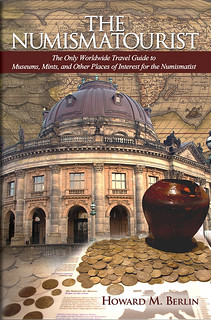
Thanks, everyone. I've passed these on to Pete for the next iteration of his list. See his new article in this issue, where he takes a look at our sister hobby - philatelic museums in the U.S. How many are there? Read on to find out.
Howard Berlin's 2014 book, The Numismatourist opens with a great review of the current money museums in the U.S. and goes on to cover the world in the bulk of the book. Pete reaches back into history to cover U.S. money museums that have closed their doors. Great work all around. -Editor
To read the earlier E-Sylum articles, see:
MONEY MUSEUMS IN THE U.S., PART ONE
(https://www.coinbooks.org/v26/esylum_v26n49a16.html)
MONEY MUSEUMS IN THE U.S., PART TWO
(https://www.coinbooks.org/v26/esylum_v26n49a17.html)
NOTES FROM E-SYLUM READERS: DECEMBER 10, 2023
Christmas 1884 Love Token on $1 Gold Piece
Bob Hurst writes:
"Thank you very much for your hard work with The E-Sylum. I enjoy reading it first thing on Monday mornings. I thought with Christmas coming up in a few weeks that readers might like to see a really nice 'love token' that I have owned for over 30 years. I have attached photos of both sides. It is a really nice Type 3, $1."
Indeed - very nice piece! Thank you. -Editor
To read the earlier E-Sylum article, see:
SILVER AND GOLD COIN LOVE TOKEN JEWELRY
(https://www.coinbooks.org/v26/esylum_v26n49a13.html)
Lincoln Cent 115 Years Old in 2024
Tom Bridgeman of Rosenberg, Texas writes:
"While reading the E-Sylum about the Lincoln cent, I noticed (what I think is) a huge mistake in Allen Davisson's article. It states that the Lincoln cent will be 125 years old in 2024. Perhaps with the "new" math it could be, but I am old enough that I use old-school math which makes the cent 115 years old.
Aside from that, the article and the entire E-Sylum is, as always, an excellent read!! Thanks for the great job!"
This is why we need publications with real editors and reporters like Coin World. Thankfully E-Sylum readers are great proofreaders and find a lot of things that slip through like that. Thanks - good catch. -Editor
To read the earlier E-Sylum article, see:
THE CLASSIC LINCOLN CENT
(https://www.coinbooks.org/v26/esylum_v26n49a23.html)
Visiting Coin-A-Rama City
Fred Weinberg writes:
"I drove there from around 1967 until they closed in the early/mid '70's, as I recall. There were other local L.A. dealers who went there on a much more regular basis than I did. I was pretty young, and just remember seeing so many ‘vest pocket' and regular dealers there, trading coins, talking, playing poker later (I wasn't in that group at that time!)."
Thanks. Coin dealers are a poker-playing bunch! -Editor
To read the earlier E-Sylum article, see:
COIN-A-RAMA CITY
(https://www.coinbooks.org/v26/esylum_v26n47a18.html)
BASF Emergency Notes
Ron Guth writes:
"Regarding the Badische Aniline Dollar in the latest E-Sylum, I don't think the name of the note has anything to do with depositing Dutch Guilders. Anilin (Analine) was a chemical product produced by BASF and was the A of the company's initials ever since its founding in 1865. Like BASF, numerous firms produced emergency money and they are more appropriately named after the firm, not after their product. Thus, the proper name for this note is BASF currency."
Thanks. That makes more sense. I wondered if I was missing something when the article described it as "the so-called aniline dollar" and later "hence the nickname Aniline Dollar". Since BASF isn't a government, rather than "currency" I think I would call it "BASF Scrip" or "BASF Emergency Money." -Editor
To read the earlier E-Sylum article, see:
THE ANILINE DOLLAR
(https://www.coinbooks.org/v26/esylum_v26n49a26.html)
1895 College Point, NY Counterfeiter
Jim Haas passed along this newspaper clipping inspired by last week's item about catching a counterfeiter. Thanks! -Editor
Jim adds:
"Officer John P. Kraebel and my great grandfather Charles Dockendorf served on the College Point Police Force in the 1890s."
To read the earlier E-Sylum article, see:
LOOSE CHANGE: DECEMBER 3, 2023 : Counterfeit Shover Eats Fake Bills
(https://www.coinbooks.org/v26/esylum_v26n49a29.html)
1894 LETTER ON MINT DOCUMENT DESTRUCTION
Roger W Burdette writes:
"A frequent complaint of numismatic researchers, and sometimes collectors, is the absence of historical documents that we knew once existed. Many of these old papers might have solutions to long standing questions, or contain insights to actions. In exploring U.S. Mint archives these gaps are obvious and extremely frustrating since they seem to hide what was once known.
"As we've gained better insights into existing files, we've also come across letters reminding us that deliberate destruction of historical mint materials has been a regular, more-or-less routine practice for the past two centuries.
"The accompanying letter is typical of others that show up about every 20 years in existing mint and Treasury Department correspondence. There's no evident intention to hide anything by destroying old documents. It's simply an opportunity to free storage space, so the whole activity can be repeated a decade or so later."
Thanks - here's Roger's transcription of the letter. -Editor
Logan Carlisle, Esq.,
Chief Clerk,
Treasury Department.
Sir:
In compliance with the request contained in the letter from Honorable Secretary of
Treasury of September 29th last, relating to the destruction of material no longer needful in the
transaction of current business at the Department, you are respectfully informed that there are in
the files of this Bureau some 125,000 documents, consisting of daily statements, reports, etc.,
from the several mints and assay offices, and miscellaneous letters on various subjects, which are
no longer of use and could be destroyed without any detriment to the public service. Owing to
the miscellaneous character of the documents above referred to, it is impossible to give a detailed
list of the same. This accumulation of papers occupies a space of 120 cubic feet, and if destroyed
would afford sufficient space for filing purposes for probably about ten years.
Very respectfully,
R. E.. Preston,
Director of the Mint.
SEMIQUINCENTENNIAL COIN DESIGN IDEAS
Wayne Pearson submitted these design ideas for coins commemorating the 2026 semiquincentennial of U.S. independence. Thanks - what do people think? What other concepts would you suggest? -Editor
Under PUBLIC LAW 116–330, SEC. 3. ISSUANCE OF REDESIGNED CIRCULATING COINS EMBLEMATIC OF THE UNITED STATES SEMIQUINCENTENNIAL. Section 5112 of title 31, United States Code, is amended by adding at the end the following new subsection:
(y) REDESIGN AND ISSUANCE OF COINS EMBLEMATIC OF THE UNITED STATES SEMIQUINCENTENNIAL.— ‘‘(1) REDESIGN BEGINNING IN 2026.—
(A) IN GENERAL.—
(i) Notwithstanding the 4th, 5th, and 6th sentences of subsection (d)
(1), the Secretary may change the design on any of the coins authorized under this section and minted for issuance during the one-year time period.
While the one cent, five cent, dime, and half dollar are not specifically mentioned, they are referred to in the ‘(D) paragraph, when they specifically mention the half dollar, heretofore NOT mentioned by denomination.
(D) DESIGNS AFTER END OF THE PROGRAM.—Beginning in 2027, any coin redesigned under this subsection shall revert to the immediately previous designs, with the exception of the quarter dollar and the half dollar, which shall bear designs in accordance with subsection (z).
In 1976, we used the Kennedy half and the Eisenhower dollar to honor bicentennial. Neither were there in 1776-but it didn't matter.
We honored the concept of 1776 on the coins and not the person.
Due to the incumbency of the six principal designs gracing our coins, with no term limits, many people have been overlooked. 2026 would be the perfect time to use some of these overlooked people.
In 1776, the three races living in the 13 colonies were the Native Americans, the Black or African Americans. And the White Americans. Representing these three races, on the coins in 2026, some of the overlooked.
- For the one cent coin-Chief Red Cloud, with a 1776 reverse design.
- For the five-cent coin-Ronald Reagan, with a 1776 reverse design.
- For the dime-Eleanor Roosevelt, with a 1776 reverse design.
- For the half dollar-Martin Luther King Jr., with a 1776 reverse design.
- And for the dollar coin-Theodore Roosevelt, with a 1776 reverse design.
References:
John Hancock
Https://commons.wikimedia.org/wiki/File:JohnHancocksSignature.svg
https://www.pcgs.com/coinfacts/coin/1989-d-50c-congress/9632
References:
Ronald Reagan
https://www.coinnews.net/2015/03/06/ronald-reagan-presidential-1-coin-design-candidates/
Liberty Bell
https://www.usacoinbook.com/coins/2841/half-dollars/franklin/1948-P/
References:
Eleanor Roosevelt
https://www.coinnews.net/2013/11/25/design-candidates-for-2014-first-spouse-gold-coins/
We The People
https://coinappraiser.com/coins/value-of-1987-5-constitution-gold-commemorative/
References:
Martin Luther King Half
https://www.raabcollection.com/american-history-autographs/mlk-sp-1960
https://www.alamy.com/stock-photo-independence-hall-clock-tower-philadelphia-pennsylvania-united-states-33727691.html
References:
Theodore Roosevelt Dollar
https://www.coinnews.net/2012/12/18/2013-presidential-1-coin-designs/
Reverse design taken from the book the Statue of Liberty is holding and structured like the Wheat cent.
https://cointrackers.com/wheat-pennies/
To read the earlier E-Sylum articles, see:
2026 INDEPENDENCE COMMEMORATIVE IDEAS
(https://www.coinbooks.org/v24/esylum_v24n34a14.html)
MORE 2026 INDEPENDENCE COMMEMORATIVE IDEAS
(https://www.coinbooks.org/v25/esylum_v25n37a13.html)
SEMIQUINCENTENNIAL QUARTER DESIGN IDEAS
(https://www.coinbooks.org/v26/esylum_v26n47a15.html)
SEMIQUINCENTENNIAL DOLLAR DESIGN IDEAS
(https://www.coinbooks.org/v26/esylum_v26n43a12.html)
SEMIQUINCENTENNIAL LOGO REVEALED
We still have no coin designs as 2026 rapidly approaches, but at least we have a logo now. Here's an excerpt from a New York Times article. -Editor
It is a very difficult word,
Mr. Haviv said, veering gracefully around the pileup of prefixes that Congress chose to describe the 250th anniversary of American independence — fast approaching on July 4, 2026.
He said semiquincentennial
just twice in an hourlong interview about designing graphics for the occasion, each time speeding through its seven syllables — semiquincentennial, semiquincentennial — as if hoping to limit the linguistic sloppiness inflicted on his otherwise sleek operation.
Mr. Haviv, 49, is a partner at Chermayeff & Geismar & Haviv, the design studio behind logos for NBC, Mobil and New York University, as well as the star emblem that represented the nation's bicentennial in 1976. The studio was contacted in March by the U.S. Semiquincentennial Commission, the group established by Congress to organize a nationwide commemoration and celebration of the milestone.
The logo, unveiled on Monday, is a continuous red, white and blue ribbon that swoops through the number 250 — neatly sidestepping the semiquincentennial
conundrum. America
floats above in custom serif text.
It's almost an impossible construction,
Mr. Haviv said of the design, which twists around itself like a Möbius strip. I think that has an additional level of meaning, because bringing people together today is almost an impossible task, but the result is beautiful.
The design was, naturally, a democratic process. All 14 members of the studio threw out ideas, suggesting stars, gradients and shades of purple. The team settled on the idea of a festive ribbon like the ones that adorn parade floats and Medals of Honor, and gathered to present sketches to one another in June.
It's a humbling moment, because you come to it with your ideas, and you love the things that you've created,
Mr. Haviv said. And then somebody will say, Well, it looks like a body part that you don't want it to look like.
They worked through hundreds of sketches by hand, then transported the design into Adobe Illustrator to agonize over details like the curvature of the ribbon in its bottom right corner. The logo was digitally rendered on T-shirts, sheet cakes, coins and baseball caps before its final version was presented to the commission in July.
Rosie Rios, the chair of the U.S. Semiquincentennial Commission and a former U.S. treasurer in the Obama administration, said she did not expect every American to love the design. What we do hope is that people can think about this as a way to see themselves, and see their state, and see their story in some way reflected.
I like it. It's also like a road, traveling through the 250 years. A road with many bumps, but one that continues on in the pursuit of a more perfect union. -Editor
To read the complete article, see:
A Logo to Unite America? Good Luck.
(https://www.nytimes.com/2023/12/04/style/america-250-anniversary-logo-design.html
To read the earlier E-Sylum article, see:
LOOSE CHANGE: APRIL 2, 2023 : U.S. Semiquincentennial Commission Rebooted
(https://www.coinbooks.org/v26/esylum_v26n14a35.html)
U.S. MINT SEMIQUINCENTENNIAL COIN SURVEYS
The U.S. Mint has their own Semiquincentennial logo. They are aware of the upcoming anniversary, and recently published a survey regarding one of their ideas - "re-issuing a selection of our greatest coins." -Editor
In honor of our country's Semiquincentennial in 2026, we'll be re-issuing a selection of our greatest coins as numismatic coins and we need your help making the decision! All you need to do is complete our quick, anonymous Best of the Mint
survey where you'll rank a series of coins. Take the survey today and be a part of a historic milestone.
I didn't get a chance to discuss this earlier, and now the survey is closed. It was an odd thing, though. It asked people to rate a set of older coin designs. It was illustrated with images of coins from the National Numismatic Collection, but the quality of the coins and images was all over the map. Some were dark looking circulated examples that did the designs no justice. It could be that the fix was in for certain designs, but more likely this was just a result of government incompetence or indifference. The survey could have been far better done.
By "numismatic coins" I assume they mean non-circulating commemorative coins or medals. Nothing to do now but wait for the next communication on the topic. -Editor
The Semiquincentennial Coin Surveys Are Now Closed
Thank you to all those who participated in our Semiquincentennial coin surveys. Your feedback is vital in helping us commemorate America's upcoming 250th anniversary in 2026.
Stay tuned to this page for more exciting updates from the U.S. Mint.
To visit the Mint's Semiquincentennial page, see:
https://catalog.usmint.gov/semiq/
VOCABULARY TERM: OVERLAP
Here's another entry from Dick Johnson's Encyclopedia of Coin and Medal Terminology. I added images. -Editor
Overlap. Two scenes, usually but not necessarily circular, shown on the same plane with the dominant scene extending into the subordinate scene. Because medals are customarily circular the two sides can often be shown this way, as one side overlapping the other. The reverse of the 1890 Benjamin Harrison Indian Peace Medal (IP-48) exhibits two circular scenes overlapped (illustrated). When the two scenes are circular and placed side-by-side (not overlapped) it is called double circle. Overlap is a type of unusual shapes.
In 1937 Chicago engraver J. Henri Ripstra created an overlap design for the American Numismatic Association Convention Badge in Washington DC that year. The symbology here was to show the importance of both obverse and reverse in one view, ideal, perhaps, for a numismatic theme in somewhat of a bell shape.
Catalog illustrations of large coins and medals are often overlapped to fit a prescribed width, particularly for picturing the item in exact size. This obviously obliterates some overlapped detail, but can be overcome by reducing the size of the illustrations and noting the scale of reduction.
To read the complete entry on the Newman Numismatic Portal, see:
Overlap
(https://nnp.wustl.edu/library/dictionarydetail/516442)
PHILATELIC MUSEUMS IN THE UNITED STATES
last week E-Sylum Feature Writer and American Numismatic Biographies author Pete Smith submitted a two-part listing of Money Museums in the United States, past and present. This week he submitted this companion piece on Philatelic Museums in the United States. Thanks! Interesting. -Editor
What was the first philatelic museum in the United States? How many philatelic museums are there currently? This listing might answer those questions, or perhaps not.
1866 The National Philatelic Collection at the Smithsonian Institution Museum of American History traces it beginning to the acquisition of a pane of 10-cent Confederate stamps in 1866. The first exposition was in 1908 following a donation of 20,000 stamps from David W. Cromwell. From 1908 to 1963, the collection was at the Arts and Industries building. In 1964 the collection was moved to the National Museum of American History.
1894 A Postal Museum was established on the first floor of the Post Office Building in Washington, DC. This was proposed by Postmaster General John Wanamaker, founder of Philadelphia department stores. In the early years it appeared to come and go. The collection was shown at the Atlanta Exposition and returned in 1906; later shown at the Jamestown Exposition and returned to a new space on the third floor in 1908. It closed in 1911 with the collection transferred to the Smithsonian.
1930 Alpheus B. Slater gave his stamp collection, valued at $25,000, to the Rhode Island Historical Society, desiring that the collection remain in Providence. In 2023, the museum still maintains the Slater Postal History Collection.
1935 Federal Stamp Museum opened in June on the sixth floor of the postal building,
Washington, DC. Several news stories reported on the opening but the name Federal Stamp
Museum
did not appear again. Other articles referred to Philatelic Museum.
1939 The U. S. Postal Service created a traveling museum to tour the country. Estimated value of the collection was a million dollars.
1948 National Philatelic Museum in Philadelphia opened on December 5, 1948, at Broad and Diamond Streets in Philadelphia. It was affiliated with Temple University. In 1960, much of the collection was transferred to the Spellman Museum of Stamps and Postal History.
1951 The Boys Town Philamatic Center opened in 1951. Millions of stamps were donated and sold to benefit the program. The center closed in August 1987. The collection was sold at auction in May 1991.
1963 Spellman Museum of Stamps and Postal History was established on the campus of Regis
College in Weston, Massachusetts. Widely promoted as The oldest philatelic museum in the
United States.
On March 30, 1973, thieves broke into the museum and stole valuable stamps.
That is a story for another time.
1982 Tacoma Philatelic Center and U. S. Postal Service Museum opened October 4. 1982. Museum assets were sold at auction in 2007.
1993 National Postal Museum. 2 Massachusetts Ave., NE. Washington, DC., Opened on July
30, 1993 in the former Washington City Post Office Building. It showcases the largest and most
comprehensive collection of stamps and philatelic material in the world.
2004 The American Philatelic Center was dedicated June 2004 affiliated with the American Philatelic Society. It is located in the former Match Factory in Bellefonte, Pennsylvania.
1914 James Farley Post Office Museum in Manhattan was between Madison Square Garden and Penn Station. The building opened in 1914. The museum was installed sometime later. The Postal History Museum was closed in 2017.
1932 Richmond Postal Museum opened in the Post Office of Richmond, Virginia. Postmaster Berkeley Williams claimed it was the first postal museum in the United States.
1960 The Postal History Museum on the first floor of the Post Office department was opened in February 1960 and closed in 1961 with the collection transferred to the Smithsonian Institution.
1969 Western Postal History Museum opened at the Arizona Historical Society in Tucson, Arizona. In 1990 the name was changed to the Postal History Foundation.
My home town of New Ulm, MN had an old post office that was converted into the Brown County Historical Society Museum. There are many old post office buildings that have been converted into various museums. The buildings have been preserved but not their postal history.
Are we missing any? Let us know if you're aware of other philatelic museums and exhibitions.
I hope to visit one of these someday - I'm curious to learn what they have in the line of crossover numismatic items such as encased postage stamps or postal currency. For bibliophiles, philatelic libraries may hold several treats - before numismatics came into its own as a hobby and science, there were many publications large and small that covered both stamps and coins. -Editor
To read the earlier E-Sylum articles, see:
MONEY MUSEUMS IN THE U.S., PART ONE
(https://www.coinbooks.org/v26/esylum_v26n49a16.html)
MONEY MUSEUMS IN THE U.S., PART TWO
(https://www.coinbooks.org/v26/esylum_v26n49a17.html)
DAVID SCHENKMAN INTERVIEW, PART SIX
Greg Bennick's latest interview for the Newman Numismatic Portal is with token expert David Schenkman. Here's the last of six parts, where Dave tells the story of buying and selling a Polhemus counterstamp on a $20 gold piece. -Editor
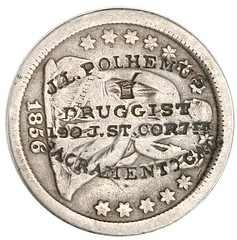 Greg Bennick: Yeah, it really is just the fascination and the fun and just following your own
lead in a way. I know that when counterstamps first came into my reality and I acquired my first
couple of pieces by a druggist from Sacramento whose last name was Polhemus, and I got
really interested in this guy's counterstamps and bought a couple of them and then started
thinking, hmm, maybe I'm going to collect specifically things that I can connect to a historical
person. And then your mind starts going and you go down that avenue and it's just fascinating
and fun.
Greg Bennick: Yeah, it really is just the fascination and the fun and just following your own
lead in a way. I know that when counterstamps first came into my reality and I acquired my first
couple of pieces by a druggist from Sacramento whose last name was Polhemus, and I got
really interested in this guy's counterstamps and bought a couple of them and then started
thinking, hmm, maybe I'm going to collect specifically things that I can connect to a historical
person. And then your mind starts going and you go down that avenue and it's just fascinating
and fun.
David Schenkman: And you can still make finds. See your Polhemus counterstamp, the mention of that, reminds me of one I had on a $20 gold piece.
Greg Bennick: Please tell us the story. It's going to make my day.
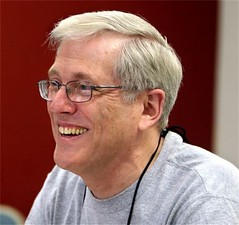 David Schenkman: Well I guess in the late seventies, a good friend of mine who owned a coin
shop in Virginia picked up a Polhemus counterstamp on a $20 gold piece. And I said, ‘What are
you going to do with it?' And he said, ‘Well, I'll probably offer it for $300.' At the time, low
grade twenties were selling for around 150. I said,
David Schenkman: Well I guess in the late seventies, a good friend of mine who owned a coin
shop in Virginia picked up a Polhemus counterstamp on a $20 gold piece. And I said, ‘What are
you going to do with it?' And he said, ‘Well, I'll probably offer it for $300.' At the time, low
grade twenties were selling for around 150. I said, Well I'll buy it, Joe.
So I bought the piece
and I started writing a column for The Numismatist in the late seventies, which I did for a
couple of years back then, and that was the subject of my first counterstamps. So John Ford
called me up shortly after that and told me he was going to do me a favor and take it off my
hands for $750. And I declined, which didn't make him very happy. So, when I had it for a few
years and I was setting up at a coin show in Philadelphia and the dealer that I bought the piece
from was at the next table. Ray Byrne, who was a good friend, he was a very advanced collector
of counterstamps, among other things, from Pittsburgh, came up to me and he said, I want to
buy your Polhemus counterstamp. I said, I don't want to sell it, and he kept badgering me. And
finally, the guy I won't mention his name, who I bought it from, came up to me, he said, Don't
be a jerk, Schenkman, but put a price on it.
I said, Okay, Ray, $15,000. The dealer I bought it
from the colors started going out of his head when Ray said,
Well I'll take it.
And so at that
time it was a record price for any token. In fact, there was a half-page article in Coin World
about it.
So, I didn't really want to sell it and so I quoted way more than I thought it was worth. And I
told Ray, I said, Ray, I think you're crazy to buy it for that.
I didn't have it with me and this
was in the spring. I said, I'll tell you what, I'm coming to an ANA and you are too. If you
decide you still want it, call me and I'll bring it, otherwise the deal's off and no hard feelings.
Well, he called me and I brought it and he bought it.
So fast forward a few more years, Ray died and his whole collection came on the market, and I bought the collection intact with another dealer. So I owned half of it again. Then the dealer decided he wanted to be a counterstamp collector and bought out my half. A few years later, he put his whole collection at auction with Dave Bowers; Bowers and Morena, I guess it was at the time, and I was real curious. Dave wrote a whole page or a page and a half about this counterstamp, and I was very curious to see what it would do. And it ended up selling for around $11,000 plus the buyer's fee.
To me, the most fascinating part of the story is this, about two months after the sale, I got a
phone call from a man who sounded like an elderly man, probably my age, probably younger
and he said, Are you the person that had the Polhemus counterstamp?
I said, Well, I did.
Why do you ask?
He said, Well, I was the person who bought it out of the auction.
I said,
Oh, well…
sensing a customer and I had a copy of Polhemus counterstamps on silver coins. I
said, Are you interested in other Polhemus counter stamps?
He said, No.
I said, Well, are
you interested in any other counterstamps?
And he said, No.
And I said, Well, why did you
buy this one? He said,
I was so intrigued with the write up in the catalog that I decided I would
like to own it.
I said, Well, how did you know what to pay?
And he said, I had no idea.
He
said I couldn't attend the sale, so I had a friend bid it for me. I told him not to go over $20,000.
So here was a man that knew nothing about it, wasn't a collector. And yet he was willing to pay
$20,000 based on the write up.
Greg Bennick: That is so great.
David Schenkman: And by the way, since then, I think three or four more of these counterstamps have turned up, some of them on these treasure ships that have been dredged up on the twenty-dollar gold pieces.
Greg Bennick: I was just about to say, if I had the chance to buy one, I don't know what I would do, depending on my financial situation at the time, but that's a fantastic story. I love the throughline of that piece being sold and sold again over the years. And I think I might be mistaken. I think there's three known on $20 gold pieces at this point.
David Schenkman: I believe one of them sold for close to $50,000 at an auction.
Greg Bennick: Sounds about right. Sounds certainly right to me. Well, this has been fantastic and I hope that you've enjoyed it David because I've had a great time talking with you today.
David Schenkman: Oh, very much.
Greg Bennick: Yeah, thanks so much for just sharing information on all of these different areas that people can explore. And I feel like this has been both biographical for you, but also informational in terms of what people can then do and then take after this interview to go explore and learn more to heighten their own awareness about some of these areas of numismatics. I appreciate it so much.
David Schenkman: Well, I'd just like to say that anybody with a serious interest, is more than welcome to email me and I'll be glad to try to help them answer that question if I can, or try to direct or point them in the right direction.
Greg Bennick: And if you like, you can say your email or I can print it on the page, whatever you prefer.
David Schenkman: I can be reached at my first initial dschenkman@verizon.net .
Greg Bennick: Well, I appreciate it. And to everybody listening, this is, as I mentioned at the beginning, a series of interviews. So this is going to be ongoing and there's an extensive list of folks that I plan to talk to. So if you've enjoyed this interview, you can listen to the other ones and watch the other ones. Some of them have a video component where I'm speaking to a live face. This one audio and all of these interviews will be on the Newman Numismatic Portal on my page there. So be sure to let people know about that. And thanks so much David Schenkman for spending some time with us today. I really appreciate.
David Schenkman: It was a pleasure.
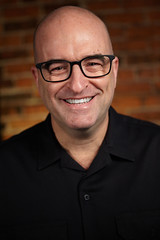 About the Interviewer
About the Interviewer
Greg Bennick (www.gregbennick.com) is a keynote speaker and long time coin collector with a focus on major mint error coins. Have ideas for other interviewees? Contact him anytime on the web or via instagram @minterrors.
To watch the complete video, see:
David Schenkman Interview
(https://nnp.wustl.edu/library/book/632911)
To read the complete transcript, see:
David Schenkman Interview (Transcript)
(https://nnp.wustl.edu/library/book/632910)
To read the earlier E-Sylum articles, see:
DAVID SCHENKMAN INTERVIEW, PART ONE
(https://www.coinbooks.org/v26/esylum_v26n45a12.html)
DAVID SCHENKMAN INTERVIEW, PART TWO
(https://www.coinbooks.org/v26/esylum_v26n46a16.html)
DAVID SCHENKMAN INTERVIEW, PART THREE
(https://www.coinbooks.org/v26/esylum_v26n47a19.html)
DAVID SCHENKMAN INTERVIEW, PART FOUR
(https://www.coinbooks.org/v26/esylum_v26n48a23.html)
DAVID SCHENKMAN INTERVIEW, PART FIVE
(https://www.coinbooks.org/v26/esylum_v26n49a18.html)
ANACS FIRST-GENERATION SLABS
While we generally avoid commercial discussions of price and grade, hobby history is fair game. This short article by Stack's Bowers Numismatist Asher Zelson examines early slabs from pioneering third-party grader ANACS. -Editor
Collectors and dealers often salivate over early and first generation holders from PCGS and NGC, eager at the prospect of upgrading coins or sending out the slabs for recognition from CAC. The terms Rattler,
OGH,
and Fatty
may sound meaningless to the layperson, but for those involved in the hobby, these monikers can be indicative of a more conservative period in third-party grading (TPG). While old holders
from PCGS and NGC often receive a lot of attention, early slabs produced by ANACS often fly under the radar.
ANACS, a firm pioneered by the American Numismatic Association, was the first company to professionally authenticate and certify coins. As early as 1972, the ANA was offering authentication, but it wasn't until 1979 that they expanded their practice into the grading of coins. Following 10 iterations of Photo-Certificates,
it was in ANACS' 11th generation of certification that the firm issued their first Slab-Style Holder.
These tiny, plastic first generation slabs, cleverly nicknamed Soap Boxes,
were the first of their kind in the marketplace and a number of TPGs quickly copied the concept, with mixed success.
ANACS Slab Generation 1 was produced from February 1989 to June 1990, and featured white labels with Official ANA Grade
printed across in blue lettering. On the back was an iridescent sticker with the dueling phrases, ANA Certified,
PNG Member Verified.
Each coin is framed by a white insert, sandwiched between a clear, hard plastic shell. As with early/first generation holders from PCGS and NGC, ANA Original Holders (OH) typically house coins that are conservatively graded by today's more lenient standards and thus carry a premium on the marketplace.
Stack's Bowers Galleries is pleased to offer seven First Generation ANA Old Holders in our December 13 Old-Holder Session of the December CCO Auction. The coins housed in these slabs range from commemorative half dollars to Morgan silver dollars, Capped Bust half dollars, and 20th-century Proof coinage. Our quarterly Old-Holder Auctions offer collectors and dealers the opportunity to cherry-pick from coins graded decades ago by PCGS, NGC, and ANACS.
To read the complete article, see:
ANACS FIRST GENERATION SLABS TO BE OFFERED IN THE STACK'S BOWERS GALLERIES OLD-HOLDER AUCTION
(https://stacksbowers.com/anacs-first-generation-slabs-to-be-offered-in-the-stacks-bowers-galleries-old-holder-auction/)
VILA RICA MOEDAS AUCTION 19
Here's the announcement for the Vila Rica Moedas Auction 19,coming up December 12-13. For bibliophiles, there is a section of numismatic literature as described in the earlier article linked below. -Editor
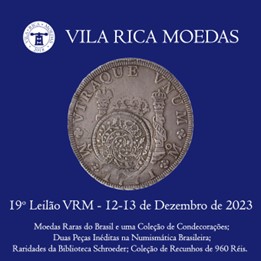 Vila Rica Moedas (www.vilaricamoedas.com) is a Numismatic company based in São Paulo,
Brazil, and it is run by its two partners David André Levy and Hilton Lúcio, both authors of
reference catalogs and accomplished numismatists.
Vila Rica Moedas (www.vilaricamoedas.com) is a Numismatic company based in São Paulo,
Brazil, and it is run by its two partners David André Levy and Hilton Lúcio, both authors of
reference catalogs and accomplished numismatists.
Vila Rica will hold its Auction 19 on December 12th and 13th. The auction is internet-only and split over two sessions. It will offer a vast range of Brazilian coins and decorations from Colonial to Republican issues, featuring:
- Two new pieces in Brazilian Numismatics: a Mexican pillar dollar counter stamped with a stamp meant only for gold ingots, and an essay in Titatium made in the 1970's by the Brazilian mint (Casa da Moeda do Brasil or CMB);
- A collection of decorations, including three exceptional Orders of the Rose, a Portuguese Badge with the Orders of Christ, Avis and Sant'iago of the Sword, an Imperial Order of the Cross and two very rare decorations from the Cisplatine campaigns;
- A collection of rare 960 overstrikes;
- Colonial silver coins, including an exceptional 640 Réis 1816M and a 960 Réis 1825P minted in the Province of Grão Pará;
-
A selection of rare books from the Cláudio Schroeder Library, including the famous
Catálogo de Medalhas Brazileiras e das Estrangeiras Referentes ao Brazil
(Catalog of Brazilian and Foreign Medals Referring to Brazil), by the Viscountess of Cavalcanti, as well as a catalog by the same Viscountess, previous to this one, extremely rare (only 25 printed copies) and missing in the vast majority of the most advanced libraries; - A selection of world coins.
Some highlights of the sale follow:
Lot 19 - Brazil, 3200 Réis, 1756/5R. Gold. AI O414. NGC XF Details (cleaned). Rare in any condition. Very few collections contain this 3200 Réis. Overdate 1756/5 clearly visible.
Lot 21 - Brazil, 3200 Réis, 1780B. Gold. AI O475. PCGS AU details (Cleaned). Very rare, and even rarer in this condition. Very attractive with some original luster still present. The marks on the reverse are on the slab, not on the coin.
Lot 78 - Brazil, 640 Réis, 1816M. Silver. AI P437; Lup 1A. Sob. Tiny nick at 8:00. Very rare and even rarer in this condition. Stronger and deeper strike than the average for this coin, resulting in a complete and perfect impression of the shield, escutcheons denomination and date, and on the reverse of the armillary sphere and showing a complete and perfect mint letter "M", thus making this one of the best existing examples of this elusive Minas Gerais issue. Legends almost complete and on top of it all a beautiful patina.
Lot 83 - Brazil, Foundry House of Vila Rica, ND (circa 1808-1810). Die for gold ingot applied to 8 Reales
silver coin. On the obverse, Foundry stamp with shield crowned between branches, below "V.R."; on the
reverse armillary sphere on cross. On the beak of the sphere semicircular detail characteristic of this reverse
stamp. The stamp, documented on 8 gold ingots between 1810 and 1812, is the Oval V.R. It was applied
twice, with the 1st application at 45° and the 2nd application at 270° in relation to the vertical axis of the
host. The second strike is weaker, with about 30% of the punch applied, and obliterating the 1st strike. The
host is an 8 Reales from Mexico, 1771FM Carlos III, columnar type (Pillar dollar
), KM# 105. 26.7g;
41mm. The coin is VF+, with a beautiful patina. Unpublished, most likely unique (although it was published
in Vinícius (1989), under Nº 706, but mistakenly ilustrating a Carimbo de Minas).
Produced at some point in the period between the end of 1808 and the end of 1810, possibly as a Minas
Counterstamp test using a gold bar stamp (there is also the possibility that it was produced in 1811-12 (while
the V.R. Oval Stamp was still active). The comparative analysis of the stamps on the bars and on the coin
leaves no doubt as to their authenticity on the pillar dollar (this piece). It is, therefore, a piece of the highest
rarity and produced at one of the most interesting moments of the Brazilian numismatic history. For a more
in-depth study, see
https://www.vilaricamoedas.com/media/textos/artigos/
Carimbo%20de%20Barra%20de%20Ouro%20Sobre%20Colunario.pdf
.
Lot 84 - Brazil, 960 Réis, 1825P. Silver. Levy – Unpublished; AI - Unpublished; Bentes 494.01. VF. 26.1g; 42.5mm. Coinage from the Province of Grão Pará. Extremely rare, with no more than a dozen reported examples. This one, struck over 8 Hispano-American Reales, is not included in the Gomes & Bertapeli catalog (2018). According to the authors, the 960 Réis coins (as well as the 80 Réis coins) with the letter "P" were issued on an emergency basis in the Province of Grão Pará. This province was in a state of total economic hardship after Brazil's independence for being the last province to align itself with the Empire and at the same time for no longer receiving support from Portugal. The creation of a provincial currency (emergency and unofficial) served as a temporary solution to prevent circulating currency from leaving the province.
Lot 85 - Brazil, 960 Réis, 1821B. Silver. AI P463a; S&R 6C; BC 1. aEF. Over-overstrike of 960 Réis 1821B over 1820B. Date of the base 960 clearly visible under the date 1821. Coin reported in the Hélio Guimarães catalog supplement (1985) as the only one known (var 22). Since then, at least two others have been identified. Still, an extremely rare and interesting coin. The coin provokes interesting thoughts - if the Bahia Mint continued to mint coins in 1817, 1818 etc. with a date of 1816, why then mind "re-dating" a 960 Réis from 1820 to 1821?
Lot 88 - Brazil, 960 Réis, 1810B. Silver. Levy 1.54; AI P395; S&R 6C; BC 18. EF. Over 8 Reales Mexico 1792FM Carolus IIII. Struck OBVERSE ON REVERSE - extremely rare on Bahia Mint coins, with only a few examples reported on some dates. According to Margraf (SNP Bulletin #95, 2023) in 1810B there are 3 reported specimens. Full visibility. Ex. Ildemar Margraf Collection.
Lot 93 - Brazil, 960 Réis, 1825B. Silver. Levy 11.66; AI P510; S&R 2A; BC 2 (E). EF. Over 8 Reales Mexican Republic 1824JM "Hookneck". While Mexican Republic 1823JM overstrikes are relatively common on Imperial coins, those with host dated 1824 are extremely rare. Beautiful coin, in an exceptional condition for the date, and with a very attractive patina.
Lot 101 - Brazil, 960 Réis, 1824B. Silver. Levy 10.131; AI P509; S&R 10C; BC 8. AU. Over 8 Reales Potosi 1819PJ Ferdin VII. Despite having been lightly cleaned, it presents itself in an exceptional state of preservation, even more for being 1824B. Interesting variety with a "shadow" of "960" displaced and below the denomination. The die sinker cut the denomination off-center, filled the cavity and reopened the digits in the correct place. Some remains are still visible around the actual denomination.
Lot 105 - Brazil, 960 Réis, 1816B. Silver. Levy 7,136; AI P401a; S&R 12B; BC 32. EF. Over 8 Reales Argentina (Potosi) 1813J. ARGENTINE SUN, on the reverse. Total visibility and rare in Bahia. Exceptional effect of the Sun on the reverse, under the armillary sphere. A spectacular overstrike. Ex. Ildemar Margraf Collection; ex. José S. da Silveira, Ex. Solano de Barros (no envelope). Reference: SNP Bulletin #52; Margraf (2009), page 64, plate coin; Margraf (2021) page 232.
Lot 108 - Brazil, 960 Réis, 1816B. Silver. Levy D.10; AI P401a; S&R 2A; BC 8. EF+. Struck on a virgin planchet (no overstrike). Extremely rare. According to Margraf (2009), there is only one piece reported. The piece offered here is not the same as the one illustrated in the reference and is therefore a second example. Beautiful patina and some remaining original luster.
Lot 116 - Brasil, 960 Réis, Carimbo Mato Grosso, SD (1818). Silver. AI P483. MBC. 26.35g; 42.5mm. One of the rarities of Brazilian numismatics - Counterstamp MATO GROSSO (in full) on 8 Reales Potosi 1798PP Carolus IIII (rare as a host than 8 Reales of Ferdin VII). Although the coin has signs of having been removed from jewelry, this fact in no way detracts from the beauty of this coin - large disc, full edges, with a beautiful patina. A practically complete stamp - MATO GROSS - only the final "O" is not visible, which makes this coin even more desirable, as it is more common for there to be much less letters visible.
Lot 122 - Brazil, 1200 Réis, 1840/37. Silver. AI P556. VF+. Overdate 1840 over 37. Very rare - only 633 pieces struck.
Lot 322 - Portugal, Decoration, 19th century. Silver. Military Order of the Tower and Sword. Knight/Dame Medal. 20.2g; 10cm (with ribbon). Small missing green enamel on the reverse but other than that, a perfect and wonderful piece. Rare as such.
Lot 323 - Portugal, Decoration, 19th century. Badge with the Orders of Christ, Avis and Sant'iago da Espada - Insignia of Grand Cross or Dignitary. Gold, silver vermeil and enamel. Obverse with an oval medallion carved and hollowed out by a floral composition centralizing a flower with four petals, bearing oval shaped badges decorated with their respective enamels on white backgrounds and borders in their respective colors, with that of the Order of Christ above and, below, that of the Order of Avis on your left and the Order of the Tower and Sword on your right. Reverse with hollow and smooth metal finish, vertical closure and pin. 54g; 66x51mm. Piece alike to that belonging to the Guilherme Guinle Collection, sold at auction by the Soraia Cals Art Office (lot 131) on 11/21/2018.
The Band of the Three Orders brings together, in a single insignia, the Grand Crosses of the Ancient Military Orders of Christ, Avis and Sant'Iago da Espada, the ancient Portuguese monastic-military orders founded in the Middle Ages. According to the official website of the Presidency of Portugal (https://www.ordens.presidencia.pt/), this unique decoration appears to have its origins in the fact that Pope Julius III granted in perpetuum, to the Portuguese Crown, the Grand Master of the three ancient Monastic-Military Orders, by the bull Praeclara Clarissimi, of November 30, 1551. The creation of the Band of the Three Orders took place in the Reform of the Orders of D. Maria I, on June 17, 1789. The sovereign decreed that the monarch must use the insignia of the three military orders simultaneously, so as not to give precedence to any of them. In this way, the Banda das Três Orders became the most important Portuguese decoration.
Lots 325 and 326 - Brazil, Military Decoration, 1822. Cisplatine Campaigns. General campaigns 1811-1812 and 1816. Silver. 4.85g (with ring); 22mm, circular medal, uniface, showing an olive tree encircled by a dragon (symbol of the House of Bragança) surmounted by a royal crown and on the banks of the Uruguay River, with the word URUGUAY below. Loose tape holder. Created according to decree of 09/25/1822. Extremely rare. No record of sales in the last 20 years. According to Fernando Chao (Premios y Condecoraciones em Territorio Uruguayo 1807-1830, Rosário, 2020) it is an extremely rare piece, with only two pieces cited among all the collections and auctions consulted: the illustrated (drawn) example in Marques dos Santos (Brazilian Military Medals, 1937) and another example in the collection of the Eugênio Teixeira Leal Museum / Memorial do Banco Econômico de Salvador.
Brazil, Military Decoration, 1822. Cisplatine Campaigns. General campaigns 1811-1812, 1816 and 1822. Silver. 6.4g; 22mm, Maltese cross medal with knobbed ends, uniface, showing in the center an olive tree encircled by a dragon (symbol of the House of Bragança) surmounted by a royal crown and on the banks of the Uruguay River, with the word URUGUAY below. Created according to decree of 09/25/1822. Extremely rare. No record of sales in the last 20 years. According to Fernando Chao (Premios y Condecoraciones em Territorio Uruguayo 1807-1830, Rosário, 2020) it is an extremely rare piece, with only a few pieces mentioned among all the collections and auctions consulted: two copies sold in ""Catalog de Monedas y Medallas en Venta en la Casa Pardo"", from 1928 (lots 1785 and 1786) and another sold by Jacques Schulman on 11/24/1970, lot 426 (which is the same example plate Meili 8).
After almost 10 years of conflict and disorder, the region we now know as Uruguay was devastated. The circumstances were such that the population was willing to accept any solution that brought some peace. It was under these conditions that the new province was annexed to the United Kingdom of Portugal, Brazil and Algarves by Treaty of July 31, 1821, sanctioned by a Congress convened by General Carlos Frederico Lécor. The annexed province is referred to by the Portuguese as ""Província Cisplatina"". Prince Regent D. Pedro decided to create a medal to distinguish all those who had fought in Uruguay under the orders of General Lécor since 1816.
The decree of September 25, 1822, officially proposes the reuse of the design of the 1813 decoration (1811-1812 campaign). For those who had fought in 1811-1812 and 1816, the medal would be the same round one (only worn on the chest with a ribbon, instead of attached to the arm) and, for those who had also fought in the 1821 campaign, the medal would be in the center of a Maltese cross, hanging on the chest by a ribbon.
Lot 329 - Brazil, Military Decoration, 1865. Meili 125; VC 97. EF. Riachuelo Naval Combat. Rare! Established in 1865. 17.5g; 43x26mm. Silver. Obverse: Pedro II on the left, surrounded by a wreath of tobacco and coffee leaves, legend "PETRUS II DG CONST. IMP. ET PERP. BRAS. DEF. 1865. On the reverse "COMBATE NAVAL DO RIACHUELO" involving a trophy consisting of a cannon and an anchor resting on a wreath of palm trees and laurels, in the center a shield with the date "JUNE 11, 1865", topped by an articulated imperial crown, from the Brazilian Mint. Commemorating the largest and most important naval battle of the Latin American history on June 11, 1865. Very rare in silver, and even rarer with the crown hinge intact.
Lot 331 - Brazil, Decoration, 19th Century. Imperial Order of the Cross - Insignia of Commander or Grand Officer. Gold and enamel. On the obverse, a star in white enamel with five double points, knobbed and lying on a splendor, with a medallion on a sky-blue background with stars aligned in a Latin cross, surrounded by a blue iron border with the legend "BENEMERENTIUM PRAEMIUM", surmounted by imperial crown. Reverse with smooth metal finish, vertical closure, and pin. 29.3g; 61x53mm. Piece identical to that in the Guilherme Guinle Collection (Lot 9, Soraia Cals Art Office, 11/21/2018). An absolutely delightful piece.
Lots 332, 333 and 334 - Brazil, Decoration, 19th Century. Order of the Rose - Commander's Insignia. Silver vermeil and enamel. Obverse with a six-pointed white enamel star set on a garland of roses, lying in a glow, with a medallion in the center surrounded by a blue border with the legend "LOVE AND FIDELITY" surrounding the intertwined initials "P" and "A". Reverse with smooth finish, vertical closure and pin. Respectively 52.2g; 62mm / 33.8g; 53x71mm / 12.47g; 37m.
After the death of Dona Maria Leopoldina in 1826, Emperor Dom Pedro I married in 1828 Dona Amélia de Leuchtenberg and Eischstädtin 1828 in a second marriage and, to immortalize this celebration, he created the Imperial Order of the Rose on February 27, 1829. This order would be intended to reward military and civilian personalities, Brazilians and non-Brazilians, recognized for their valuable performance in the State and unshakable loyalty to the emperor.
According to Meyer, P. and Bibiani, R. in the description of similar lots from the Guilherme Guinle Collection (Catalogue of the Auction Office of Art Soraia Cals, November 2018), the designs of the insignia, erroneously and often attributed to Jean-Baptiste Debret, were in fact made from originals signed by Eugène de la Michellerie and Pierre-Joseph Pezerat and would have found inspiration in the delicate embroidered roses on a certain dress of the empress
Lot 373 - Brazil, Essay, 1970s. Titanium. AI - Unpublished (RRR). UNC. Titanium is an extremely hard metal, and at the same time light. This combination of properties led CMB (Casa da Moeda do Brasil - Brazil's Mint) to assess this material for minting Cruzeiro coins, even though there was no significant production of this metal in Brazil. Due to the various attempts to control inflation in the 1960s and 1970s, the adoption of new monetary standards with Cruzeiro Novo in 1967 and Cruzeiro in 1970 opened the possibility of adopting more durable metals for minting coins, which, due to the desired monetary stability, would circulate for longer.
Thus, the CMB conducted coinage tests with titanium, with a view to eventually adopting this metal in the coinage of 1 Cruzeiro coins, manufactured from 1967 onwards. With a design very similar to the coinage tokens of the presses used at the time, with the arches of the Palace da Alvorada in Brasília, and with the representation of the gates of the Casa da Moeda in Praça da República, this essay presents the same module as the 1 Cruzeiro coins from 1967 (29 millimeters). The weight of the piece, a key characteristic for its identification, is 5.75g. Typical porosity should also be highlighted. The shallow minting depth, seen in the low detail of the lions' heads that flank the gate and in the details of the gate, can be attributed to the hardness of the titanium and the eventual low coining pressure adopted.
Much more than any technical issues, the adoption of this metal for coinage would be abandoned due to the
acceleration of inflation and the consequent reduction in the expected circulation life for these coins.
Additionally, the rise of stainless steel as a coining metal (a trend that would last in the CMB until the end of
the 1990s) would definitively put an end to this project. Titanium was never used again by CMB since then.
Extremely rare essay, with only two known examples, one in a private collection in São Paulo and the other
being precisely this piece. To see the full article, visit
https://www.vilaricamoedas.com/media/textos/artigos/
Cunhagem%20Experimental%20em%20Titanio%20na%20Casa%20da%20Moeda.pdf
.
Lot 443 - Brazil, XX Réis, 1818R. Copper. AI C472 (without stamp). EF+. For Goiás and Mato Grosso. With general stamp (Carimbo Geral) of 10 Réis. Very rare and possibly unique (previously unknown with c/s).
Lot 479 - Brazil, 37 1/2 Réis, 1828M. Copper. AI C730. NGC AU55 BN. Final year of the series. Very well struck and very attractive. 2nd highest grade in NGC. Very rare in this condition.
The auction will take place on December 12th and 13th. Registration for bidding can be done at https://leiloes.vilaricamoedas.com/. If you need assistance, please feel free to contact either David or Hilton through the email info@vilaricamoedas.com and they will be happy to assist you with registration. Bids can also be accepted through the Sixbid platform.
To read the earlier E-Sylum article, see:
VILA RICA MOEDAS AUCTION 19 LITERATURE
(https://www.coinbooks.org/v26/esylum_v26n48a03.html)
THE LUGDUNUM AUCTION 23
Dr. Jonas Emmanuel Flueck writes:
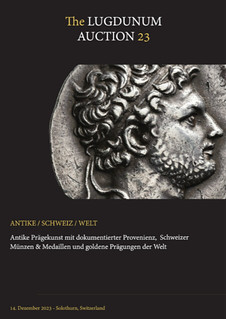 "I would like to kindly inform readers about my coming auction, The Lugdunum Auction 23, that will take place on 14 December 2023 and includes numerous provenanced ancient coins.
"I would like to kindly inform readers about my coming auction, The Lugdunum Auction 23, that will take place on 14 December 2023 and includes numerous provenanced ancient coins.
"Interesting I find, is a small collection of almost 100 Greek coins that nearly all have a documented provenance. They come from a collection made by a Swiss collector from the 1970s to the 1990s. If you look at the decription of the provenances on Numisbids, I have added a link to my Ex Numis site that shows, when you click on a given provenance, the picture of the coin in the original catalogue. I call it Ex Numis Check. It helps to make sure that the given provenance is correct.
"I have also done videos of the Ancient coins."
Here are some selected lots that caught my eye. -Editor
LUCANIA. Sybaris. Nomos circa 550-510 BC. Bull standing left on dotted exergual line, looking backwards; in exergue, VM // The same type incuse. Dewing 406; Historia Numorum Italy 1729; Jameson 1873; SNG ANS 834; SNG Copenhagen 1388. 7.77 g. Extremely fine with charming toning
To read the complete lot description, see:
https://www.numisbids.com/n.php?p=lot&sid=7430&lot=6
LUCANIA. Velia. Didrachm or Nomos circa 300-280 BC. Head of Athena right, wearing Attic helmet decorated with wing on wreath; in left field, monogram // Lion advancing right. SNG ANS 1381; SNG Ashmolean 1351; Historia Numorum Italy 1309; Williams 479. 7.27 g. Very fine with charming toning
To read the complete lot description, see:
https://www.numisbids.com/n.php?p=lot&sid=7430&lot=8
KINGS OF MACEDON. Alexander III The Great, 336-323 BC. Tetradrachm circa 330-320 BC, Byblos mint. Head of Herakles right, wearing lion's skin headdress // Zeus seated left, holding eagle and sceptre; AP monogram in left field. Müller 1375; Price 3426. 17.16 g. Attractive portait. Small scratch on reverse, otherwise Extremely fine
To read the complete lot description, see:
https://www.numisbids.com/n.php?p=lot&sid=7430&lot=26
KINGS OF MACEDON. Antigonos III Doson, 229-221. Tetradrachm circa 227-225 BC, uncertain mint. Head of Poseidon right, hair bound in seaweed // Apollo, holding bow, seated left on prow. Below, monogram. SNG Alpha Bank 1046; SNG Ashmolean 3264; SNG München 1121. 17.10 g. Extremely fine
To read the complete lot description, see:
https://www.numisbids.com/n.php?p=lot&sid=7430&lot=28
KINGS OF MACEDON. Perseus, 179-168 BC. Tetradrachm circa 174-173 BC. Attic standard. Pella or Amphipolis mint; Zoilos, magistrate. Diademed head right // Eagle, wings spread, standing right on thunderbolt; all within oak wreath; below, plow right. Mamroth, Perseus 8; HGC 3, 1091; SNG Copenhagen 1267; SNG Manchester 745. 16.89 g. Charming portrait in high relief. Extremely fine with beautiful patina
To read the complete lot description, see:
https://www.numisbids.com/n.php?p=lot&sid=7430&lot=29
KINGS OF THE SCYTHIANS. Koson circa 50 BC, Olbia. Roman consul accompanied by two lictors advancing left; before, monogram // Eagle standing left on scepter, holding wreath in its right talon. Fr. 124; RPC I 1701A. 8.44 g. GOLD. Extremely fine
To read the complete lot description, see:
https://www.numisbids.com/n.php?p=lot&sid=7430&lot=32
IONIA. EPHESUS. Tetradrachm circa 360 BC. Bee with straight wings seen from above // Forepart of stag; behind, palm tree with two clusters of dates. In the right field magistrate name: KAYTIOS. 17.10 g. Unique (?). Unpublished magistrate name (?). Slightly off-center. Extremely fine
To read the complete lot description, see:
https://www.numisbids.com/n.php?p=lot&sid=7430&lot=47
ZEUGITANA. Gold Stater circa 320-310 BC, Carthago (?). Head of Tanit (Kore-Persephone) left, wearing barley-wreath, bar and triple pendant earring and necklace with pendants // Unbridled horse standing right. Jenkins-Lewis group IV, cf. 224. 7.45 g. GOLD. Extremely fine with high relief and beautiful depiction of the horse on reverse
To read the complete lot description, see:
https://www.numisbids.com/n.php?p=lot&sid=7430&lot=83
To read the online readable printed catalogue:
https://lugdunum.auex.de/img/lose/Kataloge/Auktion_23/index.html
To view the auction on Numisbids, see:
https://www.numisbids.com/n.php?p=sale&sid=7430
NUMISMATIC NUGGETS: DECEMBER 10, 2023
Here's a selection of interesting or unusual items I came across in the marketplace this week. Tell us what you think of some of these. -Editor
Shapur I Gold Dinar
SASANIAN KINGS. Shapur I. 240-272 AD. Gold Dinar (7.33 gm; 23 mm). "The Mazda worshipper, the divine Shahpur, the king of kings of Iran who is descended from the Gods" in Pahlavi (crude), crowned and cuirassed bust right / "Fire of Shahpur" in Pahlavi (crude), fire altar with attendants; faravahr symbol (wreath) to left of flames. Göbl I/1; Paruck 81; Alram 687; MACW -; De Morgan pg. 665, 24 var. (no symbol); Sunrise 740. Lovely strike on a nice broad flan. Choice FDC. Lustrous.
Nice coin - I don't remember seeing this type before. From the Pars Coins December 18, 2023 sale. -Editor
To read the complete lot description, see:
Lot 105: SASANIAN KINGS. Shapur I. 240-272 AD. Gold Dinar.
(https://www.vauctions.com/Event/LotDetails/887387)
United Fruit Co. 2 Reales Token
Guatemala, United Fruit Co., a San Agustin 2 Reales token, obv. countermarked united fruit co., 26mm (Rulau Gma 333). Coin fine, countermark very fine, very rare £100-£120
From the Noonan's January 24, 2024 sale. -Editor
To read the complete lot description, see:
https://www.noonans.co.uk/auctions/calendar/757/catalogue/475694/
Apollo 11 Silver Robbins Medal
Apollo 11 Flown MS69 NGC Sterling Silver Robbins Medallion, Serial Number 52, Originally from The Potter-Aldrin Family Collection, CAG Certified.
This 28mm medal was one of 450 flown aboard Apollo 11, the first manned moon landing, July 16-24, 1969, with crewmembers Neil Armstrong, Michael Collins, and Buzz Aldrin. The obverse depicts Collins' early and original concept for the mission insignia with the eagle carrying an olive branch in its mouth. NASA thought the sharp, open talons of the eagle looked too "warlike" and the olive branch, representing peace, was moved to the claws. This is one of, if not the only, major official items that renders the insignia as it was meant to be by the astronaut designer. The reverse has the dates of the mission, surnames of the crew, and the serial number.
From the Heritage December 15, 2023 auction. -Editor
To read the complete lot description, see:
Apollo 11 Flown MS69 NGC Sterling Silver Robbins Medallion, Serial Number 52, Originally from The Potter-Aldrin Family Collec...
(https://historical.ha.com/itm/transportation/aviation/apollo-11-flown-ms69-ngc-sterling-silver-robbins-medallion-serial-number-52-originally-from-the-potter-aldrin-family-collec/a/6280-47040.s)
Bank of Zambia 1 Pound Unissued Proof
Zambia Bank of Zambia 1 Pound ND (1963) Pick A1 Unissued Proof Crisp Uncirculated.
Zambia, formerly Northern Rhodesia, became an independent nation in 1964. However, the previous year, British printer Harrison and Sons printed this prototype featuring Queen Elizabeth II. This design was not adopted when the Bank of Zambia issued its first banknotes, and as such is only available in Proof format. Desirable and rare, and the only Queen Elizabeth II portrait note specifically created for Zambia.
Heritage sold this one on December 8th. -Editor
To read the complete lot description, see:
Zambia Bank of Zambia 1 Pound ND (1963) Pick A1 Unissued Proof Crisp Uncirculated.. ...
(https://currency.ha.com/itm/world-currency/zambia-bank-of-zambia-1-pound-nd-1963-pick-a1-unissued-proof-crisp-uncirculated/a/4047-22426.s)
Stovepipe Hat Lincoln Cent Album
(60) Original U.S. Lincoln Memorial Cents Partial Set Collection, Estate found, Circulated and Uncirculated, Displayed in blue whitman album,
I don't believe I've ever seen a Lincoln Cent album like this. It's similar to a Whitman product but with several differences, starting with the caricature of Lincoln on the cover. Inside it has slots to display the Wheat and Memorial reverses, and after 1986 it has spaces for a 1943 steel cent and 1857-1909 small cents.
I'm lost without Dave Lange to reach out to. I looked all through his book on Whitman folders and didn't see anything like the pictorial Lincoln cover, but his catalog doesn't extend to the 1980s: Coin Collecting Albums, A Complete History & Catalog: Volume Three, Whitman Publishing Company Folders and Albums 1940-1978. Can anyone help? -Editor
To read the complete lot description, see:
Lot 81: (60) Original U.S. Lincoln Memorial Cents Partial Set Collection
(https://www.invaluable.com/auction-lot/60-Original-U.S.-Lincoln-Memorial-Cents-Partial-81-c-9F346B1B39)
JUNO ON ANCIENT COINS
Mike Markowitz published a nice article on CoinWeek about Juno on ancient coins. Here's an excerpt - see the complete article online for much more. -Editor
FOR ANCIENT ROMANS, Juno (Iuno in Latin) was the queen of the gods, sister and wife of the supreme deity, Jupiter. She was identified with the Greek goddess Hera, although Romans worshipped her under many different local cults.
As Juno Sospita (Savior
), she was a war goddess, armed with spear and shield.
As Juno Moneta (The Warner
), she was the guardian of Rome, and later the patroness of mint-workers, since Rome's mint was located in her main temple.
As Juno Lucina (Light-Bringer
), she was the protector of childbirth.
Many other attributes and epithets became attached to this complex goddess, and these symbols found their way onto coins produced over the course of centuries. In the ancient world there was no separation of church and state, and the official state religion was widely illustrated and celebrated on the coinage. During the time of the Western Roman Empire, images of Juno were especially common on coins issued in the names of empresses.
Juno Moneta
T. Carisius. 46 BCE. Silver Denarius 3.90 g, Crawford 464/2. Classical Numismatic Group > Auction 121. 6 October 2022 Lot: 749. Realized: $2,000.
Juno Moneta (the Warner
) appears on a denarius of the moneyer T. Carisius issued in 46 BCE. Her hair is tied back with ribbons and her epithet MONETA is inscribed behind her head. Not much is known about Titus Carisius. He was a supporter of Julius Caesar who survived the civil wars and was defeated the Astures in Hispania circa 25 BCE but in consequence of his cruelty and insolence, the Astures took up arms again in 22 BC.
This coin is enormously popular with collectors because it is one of the few types that depicts the implements used to strike ancient coins. One the reverse, we see a hammer, an anvil, a pair of tongs used to handle hot blanks, and a decorated rounded object that is usually described as a Vulcan's cap
, the leather hat worn by metal workers to keep flying sparks from setting their hair on fire. Some sources describe this object as a garlanded punch die
, but this now seems to be a minority opinion.
To read the complete article, see:
Juno on Ancient Coins – Roman Queen of the Gods
(https://coinweek.com/juno-ancient-roman-coins-queen-gods/)
AUSSIES QUEUE FOR TWOS
I wouldn't want to be among the crowds, but it's always nice to hear people are interested in new coins. These events occur regularly around the world these days. -Editor
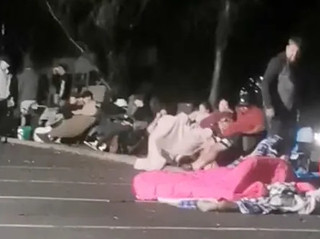 A new set of rare $2 coins, which have soared in value, are being released to the public today and the Royal Australian Mint is already being inundated by would-be collectors who queued up overnight to get their hands on them.
A new set of rare $2 coins, which have soared in value, are being released to the public today and the Royal Australian Mint is already being inundated by would-be collectors who queued up overnight to get their hands on them.
It's been 35 years since the $2 coin was released in 1988 and to honour the significant milestone
, a 14-coin collection showcasing colourful commemorative designs is being released. People started lining up outside the mint in Canberra at 3.30pm yesterday. Coin expert Matt Thompson told Yahoo Finance why demand was already through the roof
for the $239 set.
A similar 12-coin set released in 2018 for $75 is now consistently selling for over $800
, Thompson said.
Now, they are selling them with two extra coins and people are going bananas for it. The mint are run off their feet,
he said.
There are more than 2,000 people queuing up today, with just 35,000 available. An avid collector said the queue was more than 200 metres at 3.00am. Videos showed people camping overnight in sleeping bags, on camping chairs or milk crates. But the wait could be worth it. The new collection has already popped up on eBay for $1200.
It's out of control, what's happening at the moment,
Thompson said.
To read the complete article, see:
Rare $2 coins selling for $1,500 has thousands of Aussies lining up
(https://au.finance.yahoo.com/news/rare-2-coins-selling-for-1500-has-thousands-of-aussies-lining-up-001106339.html)
THE BOOK BAZARRE
SINGAPORE LINES UP FOR $10 COINS
And here we are - a story from Singapore about a run on a new $10 commemorative coin. -Editor
After visiting three different DBS Bank branches, Mr Andiappan, a 72-year-old coin collector, finally obtained eight $10 commemorative coins for the 100th birth anniversary of Mr Lee Kuan Yew.
The retiree, who goes by one name, tried the DBS Bishan branch and then the DBS Towner Road branch in Boon Keng on the morning of Dec 4 – the first day the coins were available for walk-in exchange at banks – but both had run out of coins available for exchange that day.
He then made his way to the DBS Plaza Singapura branch, where he successfully snagged eight commemorative coins at around 1.40pm after waiting for nearly half an hour.
Singaporeans and permanent residents made more than 700,000 online applications for 3.3 million coins – out of the four million minted – in a May 2023 online application exercise.
Successful applicants had until Dec 3 to collect the gold-coloured LKY100 coins, which feature a portrait of Singapore's founding prime minister. More than 700,000 coins were then made available for walk-in exchange the next day at 142 participating bank branches.
Long queues, which formed at various bank branches before they even opened on the morning of Dec 4, were cleared more quickly at some branches than others.
UOB told ST it had received overwhelming response on the first day of walk-in collection, and had put in place measures such as dedicated queues and deployment of temporary and part-time staff to help customers.
Walk-in exchanges will continue until Dec 31, 2023, or till stocks run out, whichever is earlier.
To read the complete article, see:
Some banks run out of commemorative LKY100 coin within 30 mins as walk-in exchange begins
(https://www.straitstimes.com/singapore/some-banks-run-out-of-commemorative-lky100-coin-within-30min-as-walk-in-exchange-begins)
MIKE TYSON'S BADDEST COIN ON THE PLANET
There are coins now for nearly everything and everybody. Why not Mike Tyson? -Editor
Boxing legend and pop-culture icon Mike Tyson has joined forces with Houston's Celebrity Mint to launch a limited edition series of gold and silver collectibles, just in time for the holiday shopping season.
Crafted from .9999 gold and .999 silver, the pioneering legal tender trading coins are now available on CelebrityMint.com and eBay. Thousands of viewers tuned in to eBay Live as Iron Mike joined Celebrity Mint to unveil his exclusive line of products.
This is legendary,
Tyson said on the eBay Live broadcast. This is humbling me. I'm very proud of this... This is the baddest coin on the planet.
Tyson's Celebrity Mint collectibles include:
- Iron Mike Signature Series Coins, including 1,499 2 oz. silver and 491 5 oz. silver coins. Each item is autographed by Tyson and certified by Professional Coin Grading Service (PCGS).
- 0.5 Gram Gold Legends Series cards, authenticated and certified by Numismatic Guaranty Co. (NGC) through its coin grading arm NGCX. Only 1,000 were made, including 100 chase cards with a vibrant green colorway.
- 2 oz. Silver Chibi Coins and 24k Gilded 2 oz. Silver Chibi Coins, graded by PCGS Proof Ultra Cam 69 or 70. Only 500 were made, including 50 of the 24k Gilded Silver.
We are unveiling the ultimate sports collectible piece,
Celebrity Mint co-founder Kenny Duncan Jr. said. When we founded Celebrity Mint, we wanted to work with icons – the best of the best. It is an honor and pleasure to work with Iron Mike to create these new collectibles that celebrate his legendary career.
To read the complete article, see:
Mike Tyson launches new line of gold and silver collectibles with Celebrity Mint
(https://www.globenewswire.com/news-release/2023/12/04/2790298/0/en/Mike-Tyson-launches-new-line-of-gold-and-silver-collectibles-with-Celebrity-Mint.html)
STACK'S BOWERS COSTA RICA BANKNOTES
Stack's Bowers Director of World Currency Auctions Aris Maragoudakis published an article about the Costa Rica banknote collection the firm is offering next month. -Editor
Having handled the Eldorado Collection, and the Rosenman collection just last year, we certainly aren't strangers to rare Latin American paper money. Even still, I have been in awe of these notes since I first laid eyes on them. I don't quite feel as though my voice alone should properly present this section so I reached out to a dear friend of mine, no stranger to rare notes, who belongs on the Mt. Rushmore of World Paper Money. He lends his voice here to properly introduce this collection.
Foreword to this Costa Rica selection by Pablo Hoffman of Nuevo Mundo World Paper Money.
I have been into paper money as Nuevo Mundo World Paper Money for a very long time. Costa Rica has always been one of my favorite countries to collect and deal in. I've seen a lot of Costa Rica notes… a LOT. However, when the group in the upcoming Stacks Bowers auction came along, I was stunned. This group includes not one or two, but many notes I have never seen before, and quite a few that I know are unlikely to exist in any collection, anywhere.
When the Frederick R. Mayer collection of Costa Rican banknotes was sold in New York City in 2008, I was there. It was thought at that time to be the pinnacle presentation of Costa Rican banknotes ever brought to light. And yet once again in New York City this January, Stack's Bowers Galleries and its Director of World Currency Auctions, Aris Maragoudakis, will bring to auction a new milestone in Costa Rica numismatic history and the collecting of its banknotes.
Collector interest in Costa Rican banknotes has been gradually but steadily ramping up over recent years. It seems likely that we may soon see a new impetus right off the charts.
Buckle up, because we are about to see spectacular items never before seen and accurately described in a major public auction. There are issuers never before seen. There are signed and dated examples where previously only specimens or proofs were known. There are denominations and varieties previously unknown. And there are unique pieces that will surface here, and are likely to pass into the most powerful collections on the planet, probably never to be seen again in our lifetimes.
The auction sale of this historic collection will take place at the New York International Numismatic Convention in January, 2024. I certainly plan to be there… come say hello! As a favor, I am making myself available through Stack's Bowers Galleries to discuss with you collectors and share our thoughts about some of these specific notes. (Please set up through Aris)
At last month's Whitman Baltimore Expo I took a (poor) photo of a display of some highlights at the Stack's Bowers table. -Editor
To read the complete article, see:
INTRODUCING COSTA RICAN HIGHLIGHTS FOR NYINC
(https://stacksbowers.com/introducing-costa-rican-highlights-for-nyinc/)
To read earlier E-Sylum articles, see:
FEATURED WEB PAGE: FREDERICK MAYER COLLECTION OF COSTA RICAN SILVER COINS
(https://www.coinbooks.org/esylum_v12n49a23.html)
WAYNE'S NUMISMATIC DIARY: NOVEMBER 12, 2023, PART 2
(https://www.coinbooks.org/v26/esylum_v26n46a24.html)
GAZA CASH CONVOY MOVES BANKNOTES
A secret UN convoy carried cash to Gaza banks during the recent Israel-Hamas humanitarian cease-fire. -Editor
During the Israel-Hamas truce at the end of last month, 900,000 banknotes totaling NIS 180 million were secretly moved from the north of the Gaza Strip to the south of the Strip, "The Financial Times" (FT) has revealed. The 200 shekel notes, weighing nearly a ton, were transported in a convoy of vehicles.
The unusual mission was supported by the UN under heavy security and was undertaken with the knowledge of Israel.
 The banknotes were collected from two branches of the Bank of Palestine in the north of the Strip and the transfer enabled six automated teller machines (ATMs) still operating in the south and the center of the Strip to dispense cash, the FT reported.
The banknotes were collected from two branches of the Bank of Palestine in the north of the Strip and the transfer enabled six automated teller machines (ATMs) still operating in the south and the center of the Strip to dispense cash, the FT reported.
The aim of the mission to transfer the banknotes was to bring relief to the Gaza residents and ease the situation in an economy that depends largely on cash. Before the outbreak of the war, UN figures showed that 81% of Gazan lived in poverty and relied on international economic aid.
Since the start of the war and prior to the truce, there was a shortage of banknotes in the south of the Gaza Strip, while electronic transfers are rare and inflation is raging, the FT reports.
To read the complete articles, see:
Cash convoy moves 900,000 banknotes through Gaza - report
(https://en.globes.co.il/en/article-cash-convoy-moves-900000-banknotes-through-gaza-report-1001464623)
Report: Secret Transfer of Banknotes Supports Gaza's Cash Flow Amid Conflict
(https://hamodia.com/2023/12/10/report-secret-transfer-of-banknotes-supports-gazas-cash-flow-amid-conflict-fallout/)
Unusual convoy': the mission to retrieve 900,000 banknotes from north Gaza
(https://www.ft.com/content/4efde557-1c78-45ad-9982-8855e1837fdd)
APPLE COMPUTER CHECK BRINGS BIG BUCKS
Justin Perrault sent along this article about an early Apple Computer Company check that just sold for $46,063 with the buyer's premium. Thanks. -Editor
It's not clear what Apple was buying from RadioShack on July 23, 1976 for a mere four bucks and some change, and adjusting for inflation doesn't make it much clearer. According to the US Bureau of Labor statistics, Jobs would have been cutting a check for $21.61 were he to make the same purchase in 2023.
Regardless, the check was cut around the same time the Apple-1 went on sale at Paul Terrell's Byte Shop in Mountain View, CA, for $666.66, meaning it was probably for something important. For those unfamiliar with the saga of Apple's early days, Terrell offered to buy 50 of the machines for $500 a pop, but only if they came fully assembled. Other hobbyist computers of the era typically came as unassembled kits. So solder, perhaps?
"That was the biggest single episode in all of the company's history. Nothing in subsequent years was so great and so unexpected," Apple co-founder Steve Wozniak later said of Terrell's order.
Interestingly enough, this is the second Jobs-signed check from the early days of Apple to be auctioned by RR this year – the auction house sold a $175 check from Apple to managing consultant firm Cramptom, Remke & Miller in May for $106,985.
Anything signed by Jobs, who was famously averse to autographs, can go for a small fortune to the right collector. A 1983 letter from Jobs to a fan asking for an autograph, in which Jobs both declined the request for an autograph and signed the letter, was sold at auction by RR in 2021 for a whopping $479,939.
To read the complete article, see:
Steve Jobs' $4.01 RadioShack check set to fetch small fortune at auction
(https://www.msn.com/en-us/money/news/steve-jobs-4-01-radioshack-check-set-to-fetch-small-fortune-at-auction/ar-AA1l2VWF)
To read the complete lot description, see:
Steve Jobs Signed 'Apple Computer Company' Check to RadioShack (July 23, 1976)
(https://www.rrauction.com/auctions/lot-detail/348161106800099-steve-jobs-signed-apple-computer-company-check-to-radioshack-july-23-1976/?cat=0)
NOTEWORTHY ISSUES 0.005 BITCOIN NOTE
Numismatics covers both coins and paper money, and so does the cryptocurrency world. Physical bitcoins have existed for some time and have been the focus of high-profile sales in recent years at Stack's Bowers and Heritage. In 2020 a new firm entered the market with a physical crypto banknote offering. In a press release, Noteworthy announced a new "5 millibit" note. -Editor
Noteworthy, the premier designer of physical cryptonotes, announced the sale of its new 5 millibit (mBTC) note, the first small-denomination, fully fungible bitcoin cryptonote. This new bill, which equates to 0.005 BTC (approximately $85 based on today's prices) makes buying crypto simple for people of all ages and backgrounds through its familiar cash format. Following the successful unveiling of its 1BTC note at CoinDesk's Consensus in June 2022, this smaller denomination lowers the barrier to entry, helping to increase access and drive adoption of digital assets.
Noteworthy combines the utility of paper money with the security benefits of digital assets and blockchain technology. Cryptonotes are produced with the most advanced secure printing features used by the world's largest central banks today, including intaglio and ultraviolet security printing and 8000 DPI resolution. Users can instantly validate their cryptonote by scanning the QR code, which is associated with a public wallet address for each loaded cryptonote. These advanced features create a formidable security architecture, ensuring that all cryptonotes with an intact hologram (which secures the private key) can be trusted as fungible money in exchange for goods and services in the physical world.
Digital currencies, issued and maintained using blockchain and distributed digital ledgers, have the potential to change how people and organizations transact value, eliminating the need for costly payment intermediaries, providing greater price stability, and diminishing counterparty risk,
said Noteworthy Co-Founder Peter Vessenes. A physical bitcoin note can democratize access to financial systems, and is a great option for ‘unbanked' populations in developing or remote regions to have the means to buy, sell, save, and invest more easily than before.
Since it was founded in 2020, Noteworthy has recruited the banknote industry's leading designers, suppliers, and manufacturers to create the world's most advanced, well-designed, and counterfeit-resistant physical currency. Notable team members include Manuela Pfrunder, the designer of the ninth series Swiss Franc and 2016 IBNS Banknote of the Year winner and Edmund Moy, the 38th Director of the United States Mint.
Physical currency is worth more than just its value. It forms a certain emotional connection between itself and its beholder,
said Larry Felix, Co-Founder of Noteworthy and former Director of the US Department of the Treasury's Bureau of Engraving and Printing. Noteworthy cryptonotes are designed to evoke that same feeling, while providing top-of-the-line security in a comfortable, familiar format.
The 5mBTC cryptonote features a hand-engraved portrait of legendary Austrian economist Ludwig von Mises. Von Mises was selected in honor of his strident belief that autonomous money chosen freely by the people was fundamental to the cause of freedom, a vital protection of the people against the encroachment of totalitarian governments.
Ludwig von Mises's powerful human-oriented approach to economics, combined with his insight that governments are inefficient capital allocators, remains as relevant – and necessary – as when he wrote them decades ago,
said Vessenes.
As the line between national and global economies becomes more and more blurred, people will want a currency that fits financial fluidity – but buying cryptocurrency is really hard for most people. Paper money is a very old, very familiar technology that happens to work very well. Noteworthy is the printer for this new era of post-national currency, starting with the 1BTC and 5mBTC cryptonotes.
Noteworthy's 5mBTC cryptonote is available for sale in a limited quantity. Beginning in 2023, Noteworthy will expand its partnerships to incorporate additional blockchains to develop and manufacture bespoke cryptonotes. Visit noteworthy.ag to get your own note or for more information.
About Noteworthy
Co-Founded in 2020 by cryptocurrency pioneer Peter Vessenes and the former Director of the Bureau of Engraving and Printing under the U.S. Treasury Larry Felix, Noteworthy is the premiere designer of physical bitcoin banknotes, called cryptonotes. Cryptonotes are masterfully designed, high-tech paper notes that can be held in both a physical wallet and a digital wallet simultaneously, combining the utility of paper currency and the security of blockchain technology. Noteworthy currently offers two denominations, a 1BTC cryptonote and its new 5mBTC cryptonote, which lowers the barrier to entry to the world of digital assets. For more information, visit
www.noteworthy.ag.
To read the complete press release, see:
ADDING MULTIMEDIA Noteworthy Drives Cryptonotes into the Mainstream with New 5 Millibit Bitcoin Banknote
(https://www.businesswire.com/news/home/20221207005233/en/)
Bitcoin itself has had a good year despite the upheaval in the industry (see FTX, Biance), enabling Noteworthy to boast that "In 2022, families in 10 different countries across the EU and North America upgraded their cash giving from fiat cash and gift cards to cryptonotes and the impact have been nothing short of spectacular. Recipients of cryptonote gifts in Christmas 2022 have enjoyed over 250% returns as Bitcoin has rocketed from $16,500 last year to over $44,000 today." -Editor
To buy some crypro stocking-stuffers, see:
https://noteworthy.ag/
To read earlier E-Sylum articles, see:
BITCOIN BANKNOTES
(https://www.coinbooks.org/v24/esylum_v24n11a32.html)
NUMISMATIC NUGGETS: DECEMBER 4, 2022 : 1BTC Cryptonote
(https://www.coinbooks.org/v25/esylum_v25n49a25.html)
https://www.coinbooks.org/v26/esylum_v26n24a26.html
(https://www.coinbooks.org/v26/esylum_v26n24a26.html)
LOOSE CHANGE: DECEMBER 10, 2023
Here are some additional items in the media this week that may be of interest. -Editor
Lianna Spurrier published a nice article for CoinWeek about WWII coinage. Here's an excerpt - see the complete article online for more. -Editor
World War II affected coins almost everywhere around the world.
In the United States, the most dramatic effect that the war had on our coinage was the steel penny. The composition of our nickels changed as well, but that wasn't an immediately noticeable change in the appearance of the coin. Both changes are well-known by collectors today.
But in other countries, the coinage was changed in much stranger and farther reaching ways than steel cents and partially-silver nickels. This article presents a sampling of the fascinating coin experiments conducted abroad.
To read the complete article, see:
How World War II Created Strange and Unusual Coins
(https://coinweek.com/world-war-ii-strange-unusual-world-coins/)
Check collecting is popular with a whole new demographic - crooks. This New York Times article discusses the trend. -Editor
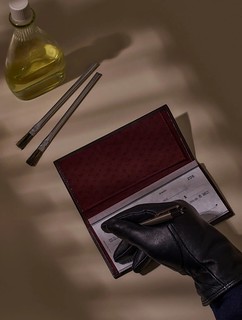 What was once a routine way to pay your bills — handwriting paper checks at the kitchen table, dropping envelopes into a blue metal box on the street — has become a high-risk endeavor: It provides the raw materials for low-level fraud artists and sophisticated crime rings, costing financial institutions billions. It has put banks on high alert, though their efforts to catch the fraud also routinely entangles innocent customers, causing institutions to suddenly freeze or shut down customer accounts in the process. Many of the bad guys manage to disappear without any consequences.
What was once a routine way to pay your bills — handwriting paper checks at the kitchen table, dropping envelopes into a blue metal box on the street — has become a high-risk endeavor: It provides the raw materials for low-level fraud artists and sophisticated crime rings, costing financial institutions billions. It has put banks on high alert, though their efforts to catch the fraud also routinely entangles innocent customers, causing institutions to suddenly freeze or shut down customer accounts in the process. Many of the bad guys manage to disappear without any consequences.
Fraudsters go where the money is easiest,
said Chad Hetherington, a vice president at NICE Actimize, a financial crimes company specializing in fraud prevention.
Even as check usage has rapidly declined over the past couple of decades, check fraud has risen sharply, particularly since the pandemic. The cons may start with stealing pieces of paper, but they leverage technology and social media to commit fraud on a grander scale, banking insiders and fraud experts said. In the past, criminals needed a special internet browser that would grant entry into the dark web marketplace of stolen checks, maybe even someone to vouch for them — now all they need is an account from Telegram, a messaging app.
A recent surge in mail theft caused the Financial Crimes Enforcement Network — an arm of the Treasury Department known as FinCEN that is charged with safeguarding the financial system — to sound alarm bells this year. Thieves have attacked mail carriers, or stolen and sold carriers' arrow keys, which unlock mailboxes within a certain area. The checks are stolen from the mail, and then criminals carry out a classic fraud: washing
the checks using something as basic as nail polish remover, leaving the signature untouched. Others cook
new checks by scanning and altering the old ones.
To read the complete article, see:
We Can't Stop Writing Paper Checks. Thieves Love That.
(https://www.nytimes.com/2023/12/09/business/check-fraud.html)
An article by Stack's Bowers Currency Auction Associate Bradley C. Trotter discusses the changing colors of the 1864 Confederate $500 note. -Editor
As the conflict wore on, the Confederacy faced increasing supply issues stemming from repeated defeats on the battlefield and a deteriorating economy. Domestic supply shortages combined with access to European markets being increasingly cut off by Union naval blockades, the production of Confederate banknotes began to suffer.
This phenomenon is perhaps best illustrated by the $500 note issued in 1864 (T-64). It bears the portrait of then recently deceased Lieutenant General T.J. Stonewall
Jackson at right along with the Great Seal of the Confederate States of America with battle flag at left. This note is arguably one of the most striking and elaborate among those produced by the Confederacy.
Early issues of this denomination featured a reddish hue that offered visually striking contrast with the various design elements. Later printings for the most part lacked this aesthetic distinction due to difficulty acquiring the ink used to produce these notes.
Printers diluted their ink stocks to make it last longer, which resulted in the loss of color on most examples of the type. Once a bright red, the notes printed using diluted ink stocks came to display a less and less prominent pinkish hue with each subsequent printing until a new supply of red ink was received at some point toward the end of the conflict. Those printed using the new supply of ink bear an even darker shade of red compared to previous printings.
To read the complete article, see:
THE CHANGING FORTUNES OF WAR: THE CHANGING COLOR OF THE C.S.A. $500
(https://stacksbowers.com/the-changing-fortunes-of-war-the-changing-color-of-the-c-s-a-500/)

